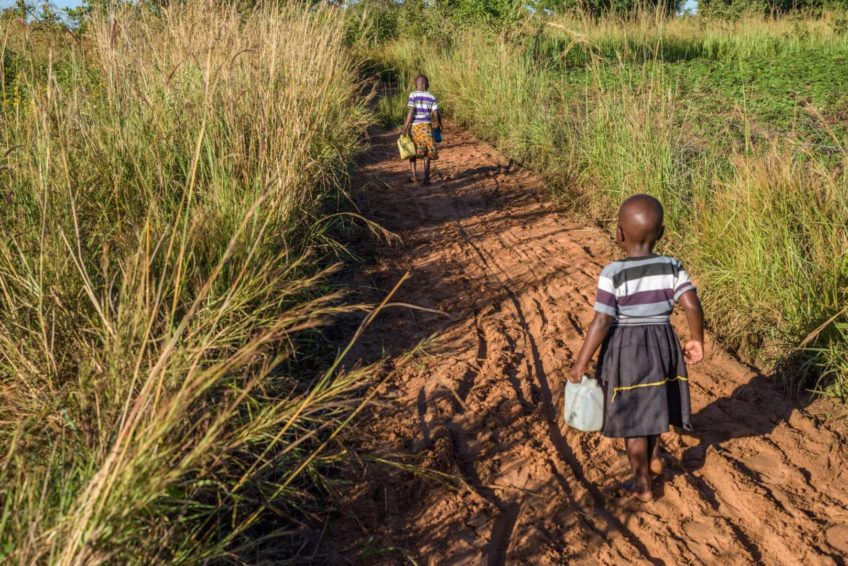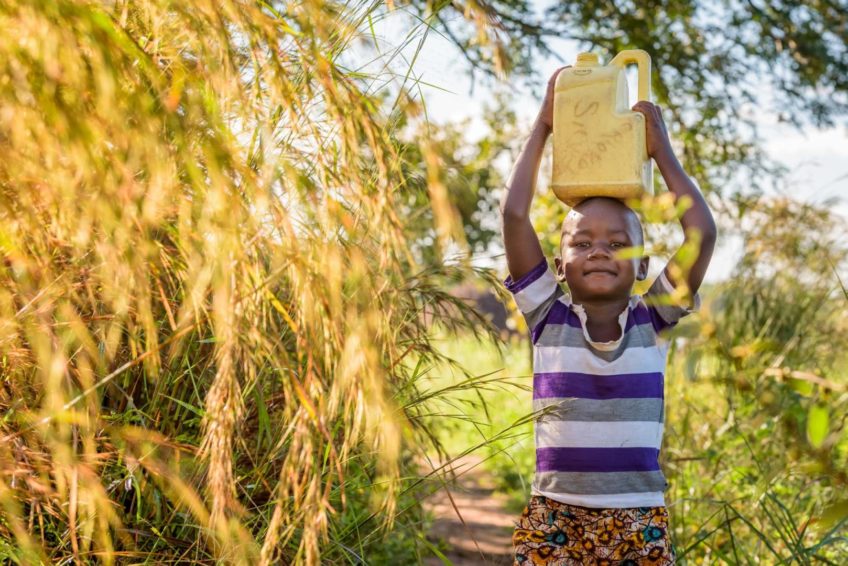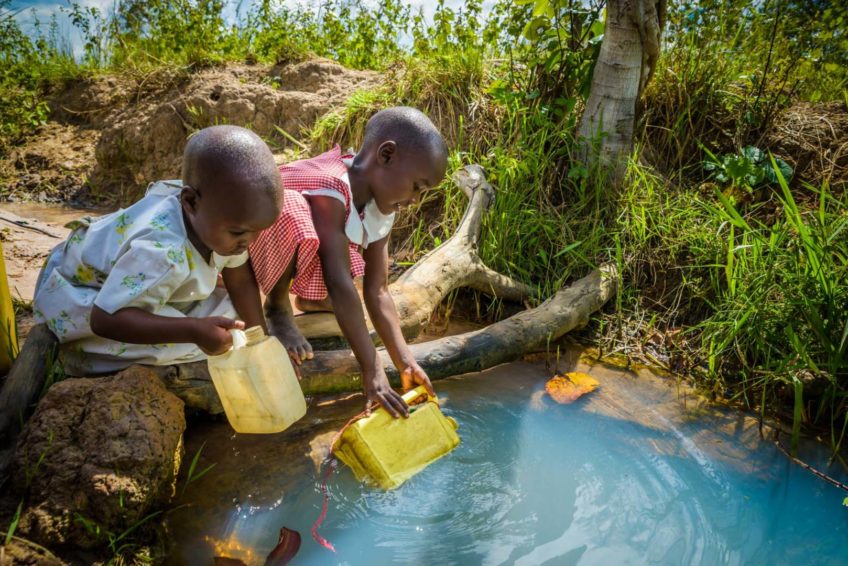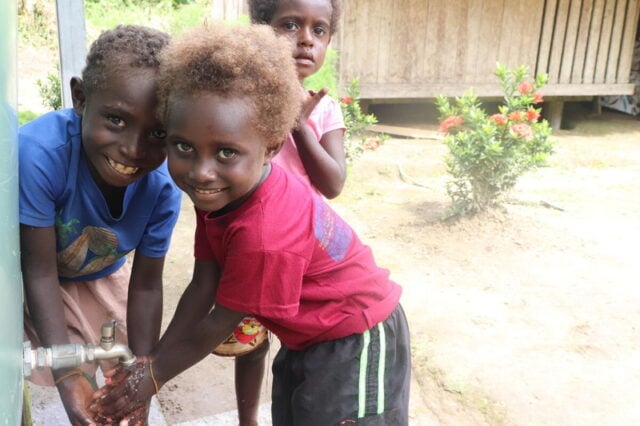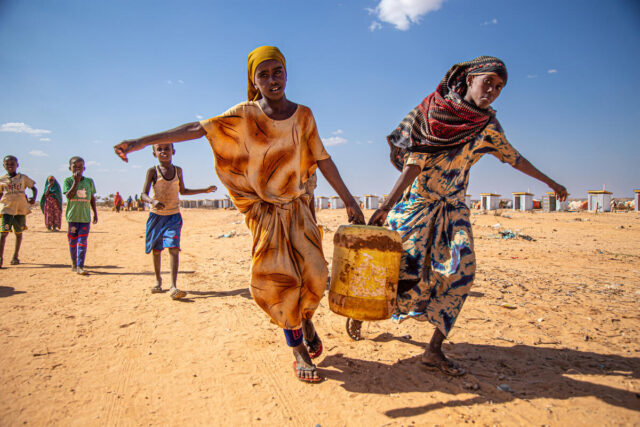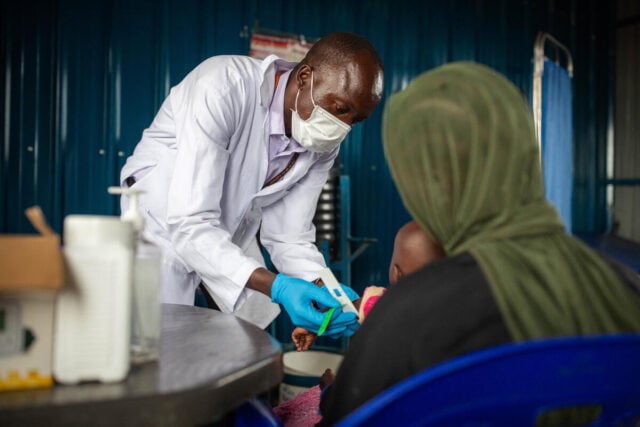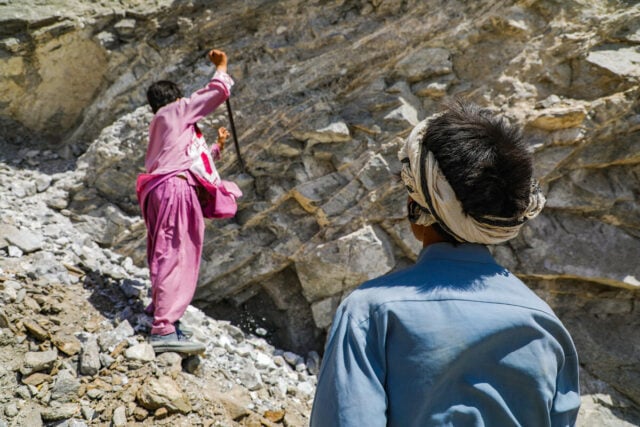In eastern Uganda, a community is still reeling from the Lord’s Resistance Army insurgency more than a decade ago. Children must walk a long way for dirty water while parents are still walking an emotional path of healing. Through it all, access to clean water would help everyone heal and have a fuller life.
At daybreak, Asamo Grace’s tiny 5-year-old feet swiftly carry her along the narrow dirt path. She softly hums her ABCs as butterflies flutter before her and crickets chirp in the dry grasses she brushes past. As the Ugandan sun begins its day’s journey across the bright blue sky, Grace begins her journey for water.
Grace’s little sister, Asimo Judith, who’s a month shy of her third birthday, scampers behind, struggling to keep up as they make their way through the high grasses that stand far taller than both girls.
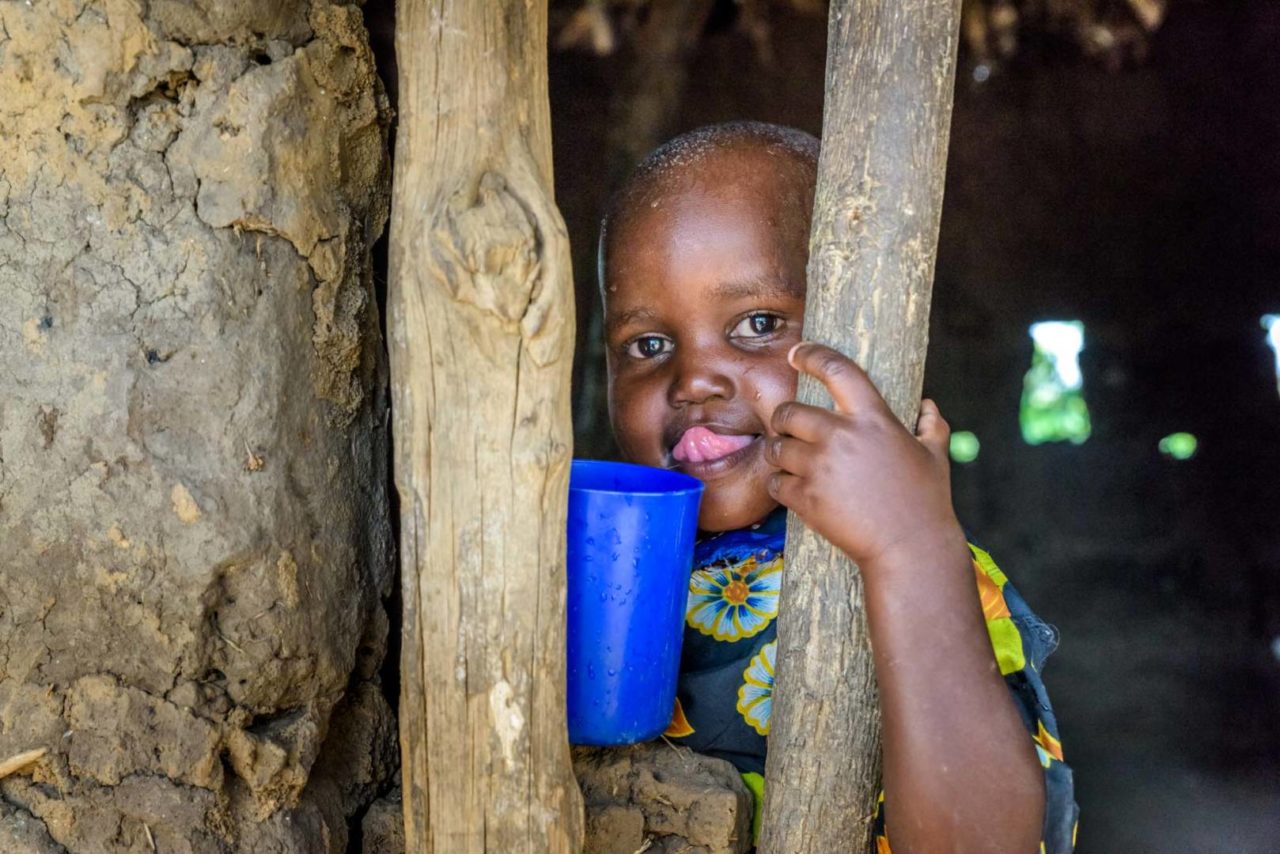
But unlike so many people who begin their day with morning exercise, this 1.75-mile walk in Morungatuny, Uganda, isn’t for fun or to take in the beauty of a peaceful morning. It’s out of necessity — Grace and Judith are making the day’s first trek to get water for their family.
With the nearest borehole about 6 kilometers (3.7 miles) away, the journey for clean water is more than 7 miles round trip. So the family instead settles for contaminated swamp water that’s half that distance — about 2.8 kilometers (1.75 miles) — away.
Grace and Judith must make their daily trek so the family can survive, and struggling for survival is what this community is accustomed to.
A wounded community
Life was already challenging for the people of Morungatuny, but in June 2002, their world became downright terrifying when Joseph Kony’s Lord’s Resistance Army (LRA), a rebel group operating in Uganda and neighboring countries, moved into the area. The LRA launched its insurgency in 1987, aiming to create a new government based on a twisted interpretation of the Ten Commandments. Over the years, the LRA abducted tens of thousands of children, forcing them to fight or marry its soldiers, who murdered, raped, and destroyed.
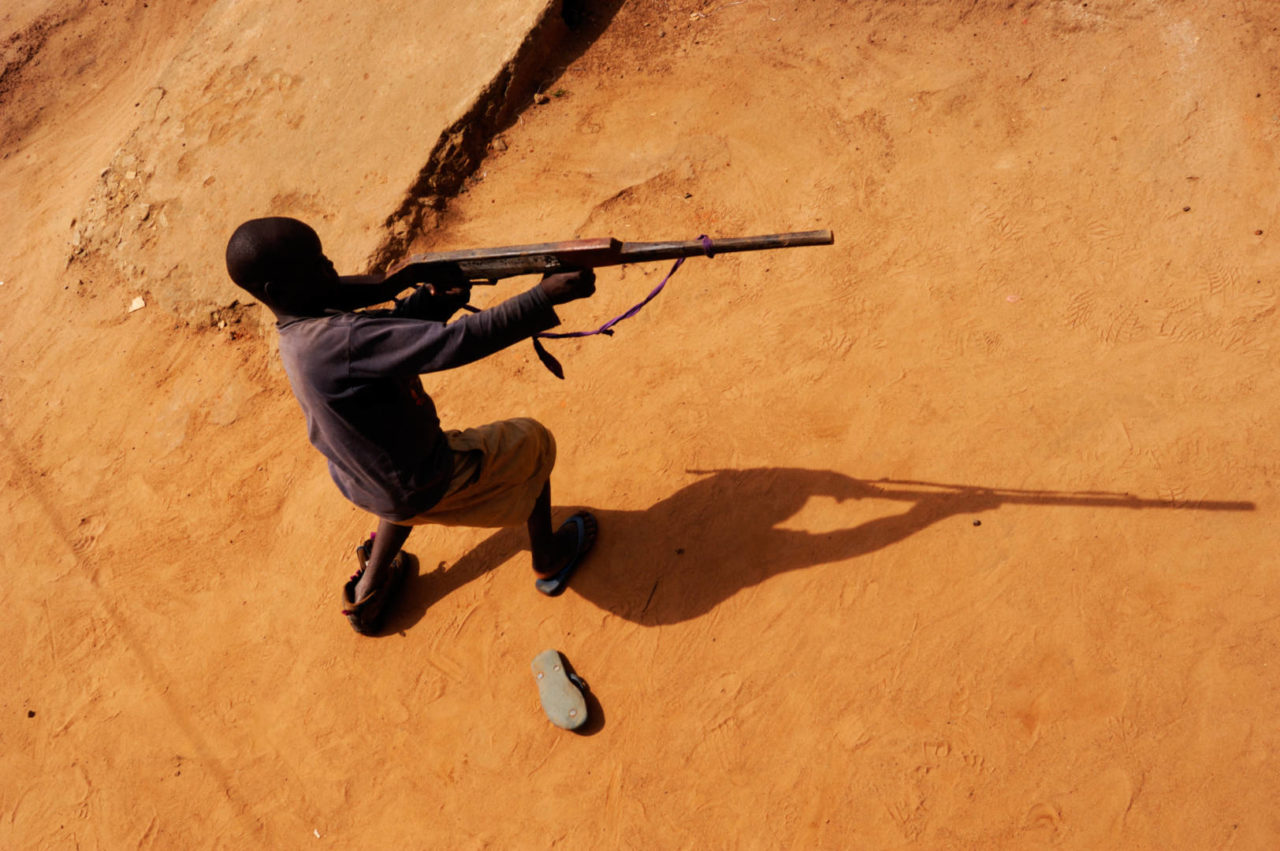
Auma Mary Margaret, 55, is a local official in Morungatuny. She remembers the horror.
“We rely on cows, which were being eaten by the rebels,” Mary Margaret says. “Food eaten. Houses burned. Most of the schools were destroyed. You couldn’t remain at your home alone.”
To protect people during the insurgency, the Ugandan government created camps for families while it fought the LRA. Borehole wells were installed at the camps, but there was little access to food. Children cried in anguish as they starved. As the calendar changed to 2003, the death toll rose, and desperation drove parents to take bold, dangerous risks.
I was arrested and badly beaten, almost to the point of death. —Joseph
Grace’s parents made the perilous trek home to their farm to gather food, but as they harvested cassava, LRA soldiers found them. “I was arrested and badly beaten, almost to the point of death,” says Joseph, 35.
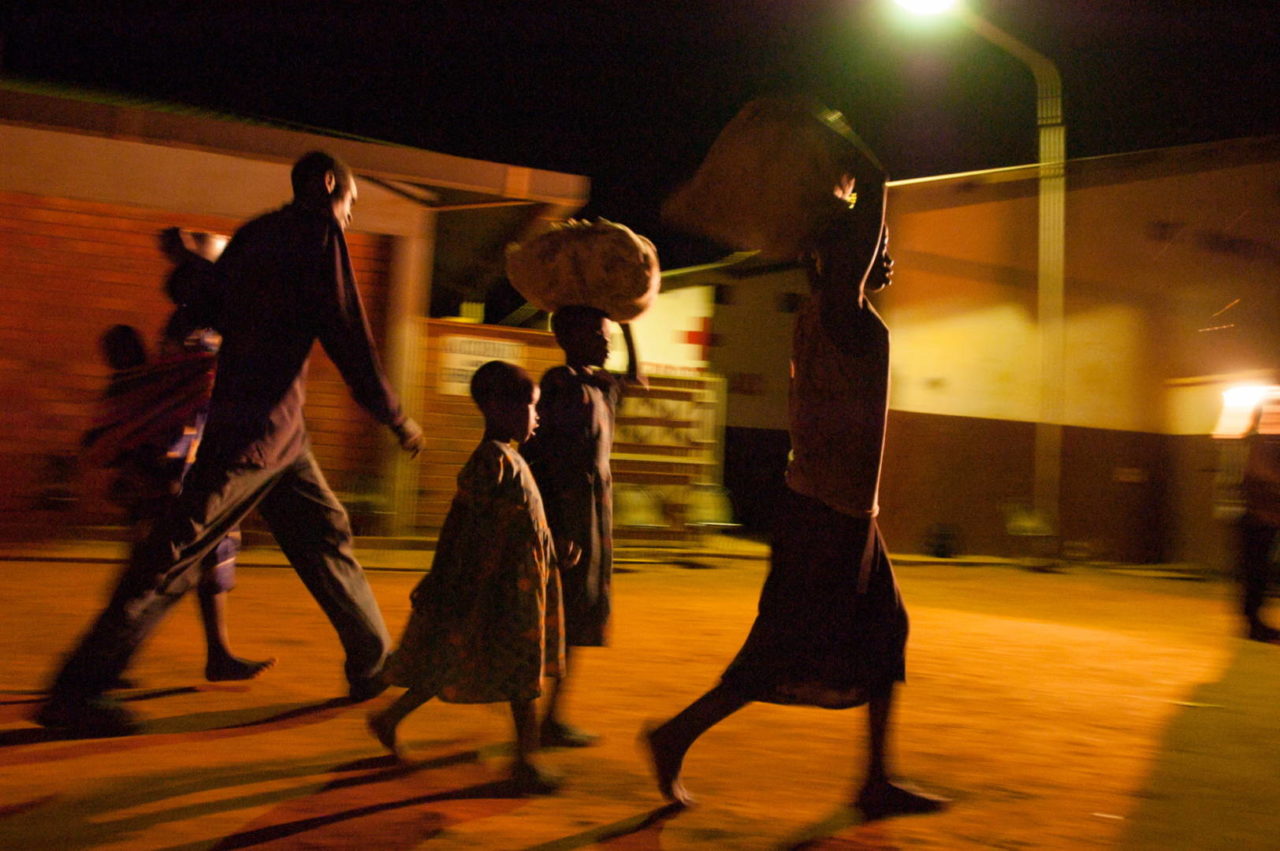
Soldiers tortured him for six hours. He’s never fully recovered from his injuries due to the lack of medical care in the community. His wife, pregnant at the time, also suffered. “When we were arrested, they separated us, so she was taken in a different direction. I was tortured, and she was tortured.”
The extent of her injuries suggests the worst. “She poured blood,” Joseph says. They lost their baby.
As the government cleared the area, families returned home. Joseph and his wife had more children, including Grace and Judith, but because of their emotional and physical pains, problems arose in their marriage. Joseph’s wife left home two years ago and has failed to return.
Their story isn’t unique. Many people in the community recount terrible events.
People are still traumatized. —Patience
“People are still traumatized,” says Abugo Patience, senior secretary in Morungatuny’s government.
While it’s been more than a decade since the area was under immediate threat from the LRA, the fear hasn’t faded. If Joseph hears a gunshot, it takes him back. He says, “You begin standing [close] with your children, and you get suspicious. You’re peeping around, but you don’t want to get out of the home. At night, you can’t sleep because you think it’s another attack.”
When he can sleep, his slumber is often ruined by torturous nightmares.
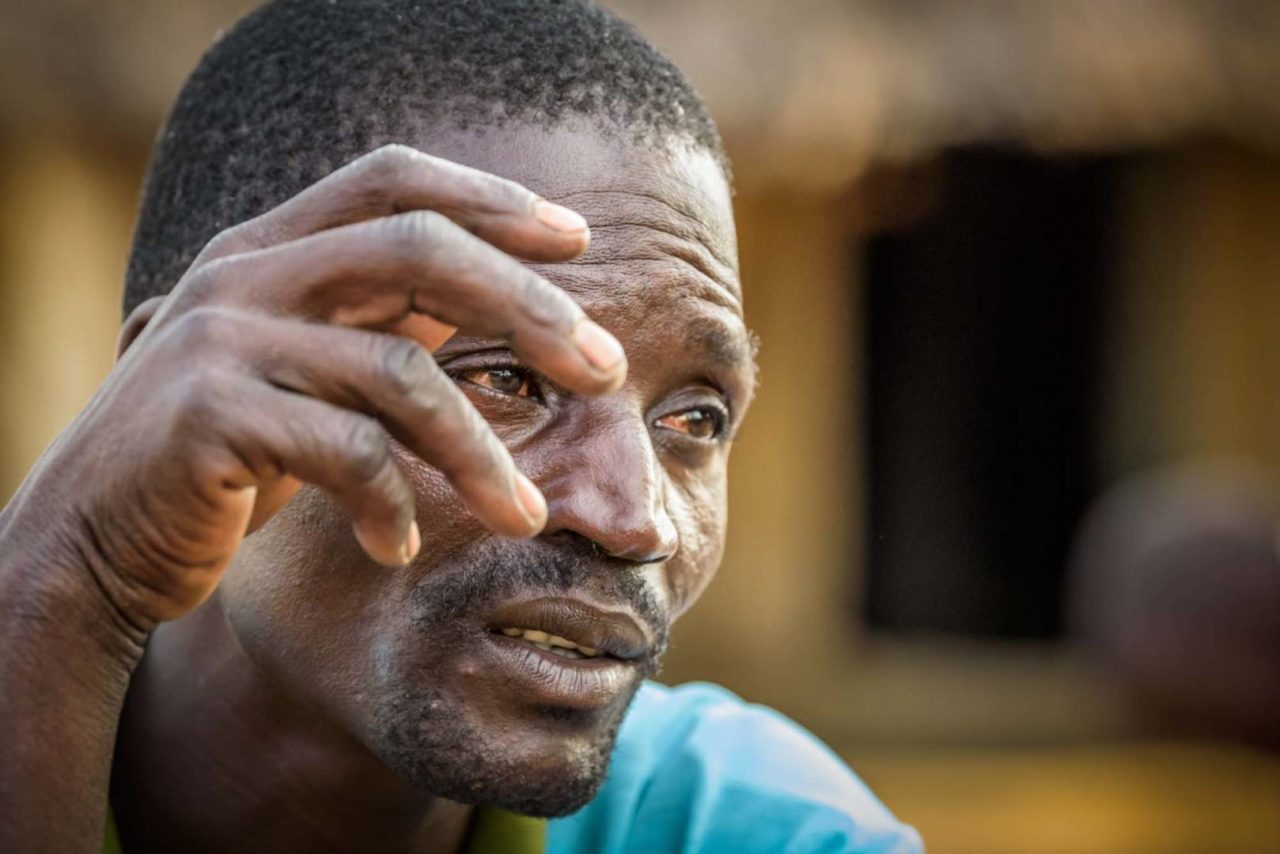
“There are moments in dreams that the soldiers and rebels have again come, and when I dream, I get up and find my body very painful. I feel as if it’s a fresh wound,” Joseph says. The dreams emotionally rip open the wounds so desperate to heal.
Wanting to move forward, Joseph eventually remarried and clings to his faith to help him lead his family. He says, “I have a family that has survived, by the grace of God, and we have our hope in God.”
Water struggles
After a shaky peace deal was established in 2006, people began returning home. But they faced a water problem. The boreholes drilled during the war were by the camps, which weren’t close to people’s normal homes. Aluka Elizabeth, the area program manager for World Vision in Morungatuny, says there are 37 borehole wells across the larger district — but only 20 are functional.
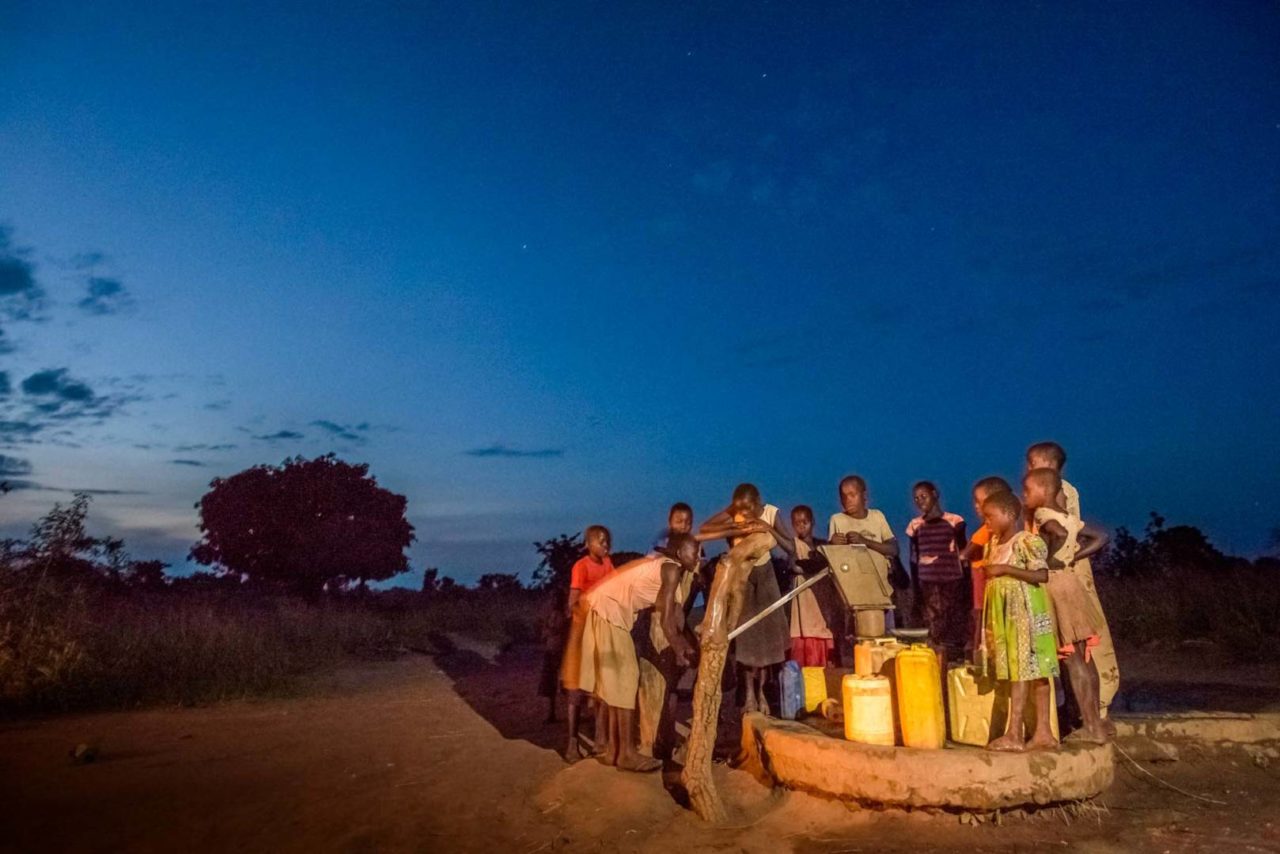
“The others got spoiled,” she says. “All of these were put in by the government and local partners during the insurgency to manage the larger populations in the camp. At that time, World Vision was not there.”
Patience, 25, says clean water in the district is accessible — within 1 kilometer — for about an abysmal 20% of people.
People in the developing world walk an average of 6 kilometers (3.7 miles) a day for water. In Morungatuny, if people want to access clean water, the only reliable borehole is about 6 kilometers one way. Joseph says it can take between 90 minutes and two hours to walk that distance.
Every borehole serves more than 850 people, which makes them incredibly crowded. Joseph says, “Then when you get to the water source, you can take two or three hours” because the line is so long, as it serves six communities.
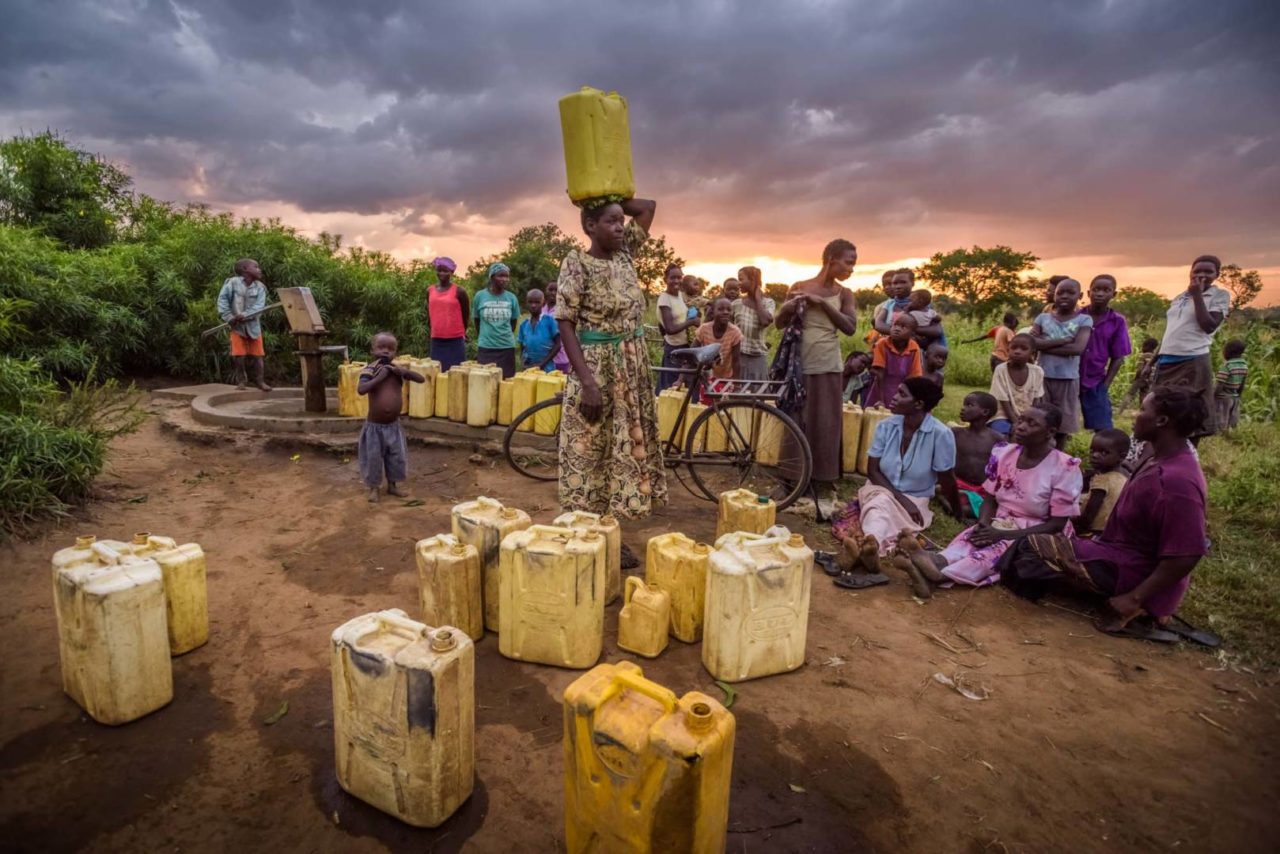
Even if families wanted to endure the walk and wait, the fields often flood and cut off access during the rainy season.
So many families, like Grace’s, opt for the shorter walk to the dirty swamp. But that creates a host of other challenges.
Safety struggles
Tall grasses more than twice as high as Grace’s tiny frame overhang the path she takes to get water. There are noises and rustlings aplenty — goats, cows, and pigs roaming; men zooming by on bicycles; and other women and children also walking for water.
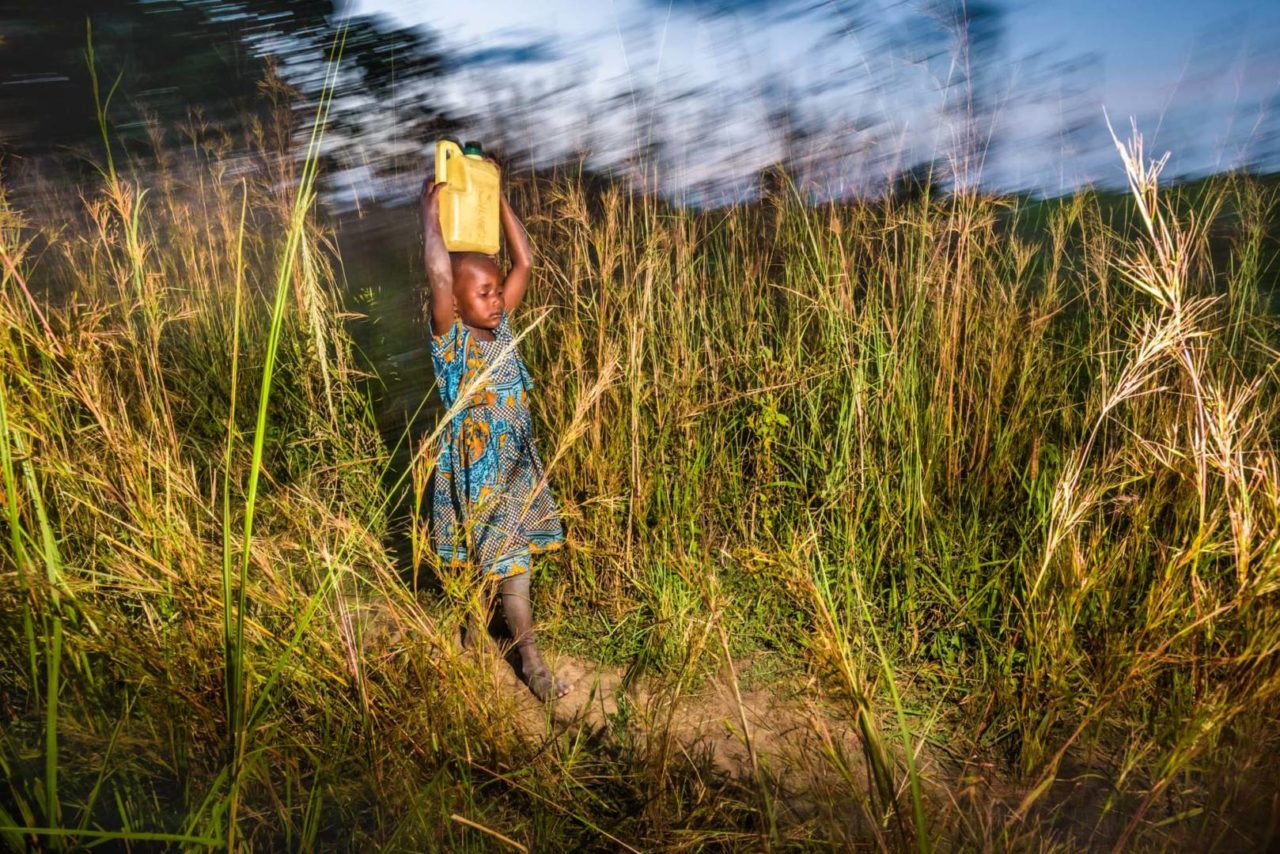
Together, the sounds create a kind of symphony. But not all the sounds are innocent. One of the biggest concerns for children like Grace is safety. Her long walk is fraught with opportunities to get hurt or for others to hurt her. In 2016, a child in a neighboring community was kidnapped while walking for water.
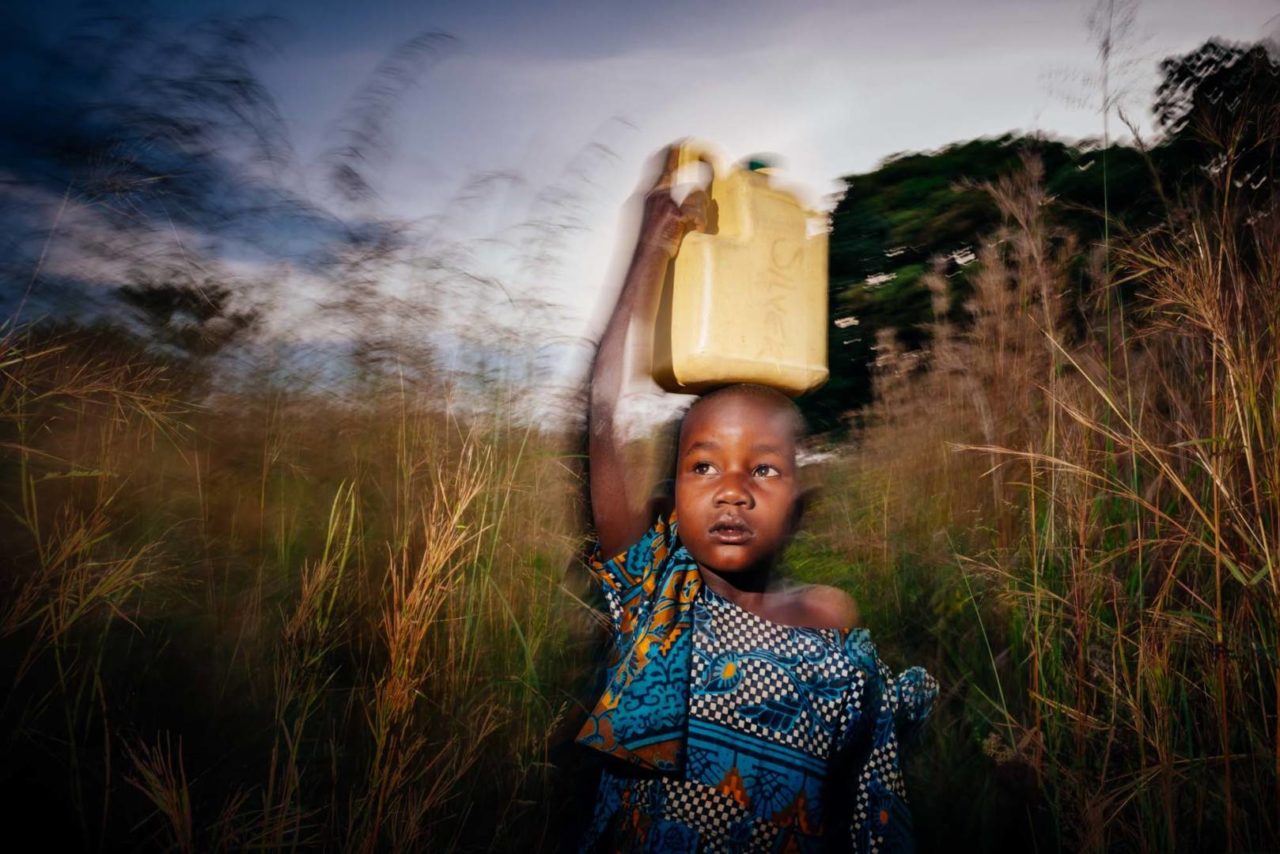
“It frightens me moving alone along that long, bushy road,” Grace says, her voice barely audible. “I fear kidnappers — they use sacks and put the sack on your head.”
I fear kidnappers — they use sacks and put the sack on your head. —Grace
Sexual assault and broken bones from falling are also a risk. But safety isn’t only an issue for children. In a community with such deep emotional wounds, tempers can be short. Often husbands will accuse their wives of infidelity because they’re suspicious of how long the women are gone for water.
“The issue of water is causing domestic violence,” Patience says.
Education struggles
When Grace arrives late at her school, St. Mika, she stands nervously outside, reluctant to burst under the thatched-roof structure to join her classmates. Sometimes administrators and teachers scold or even beat her for being late.
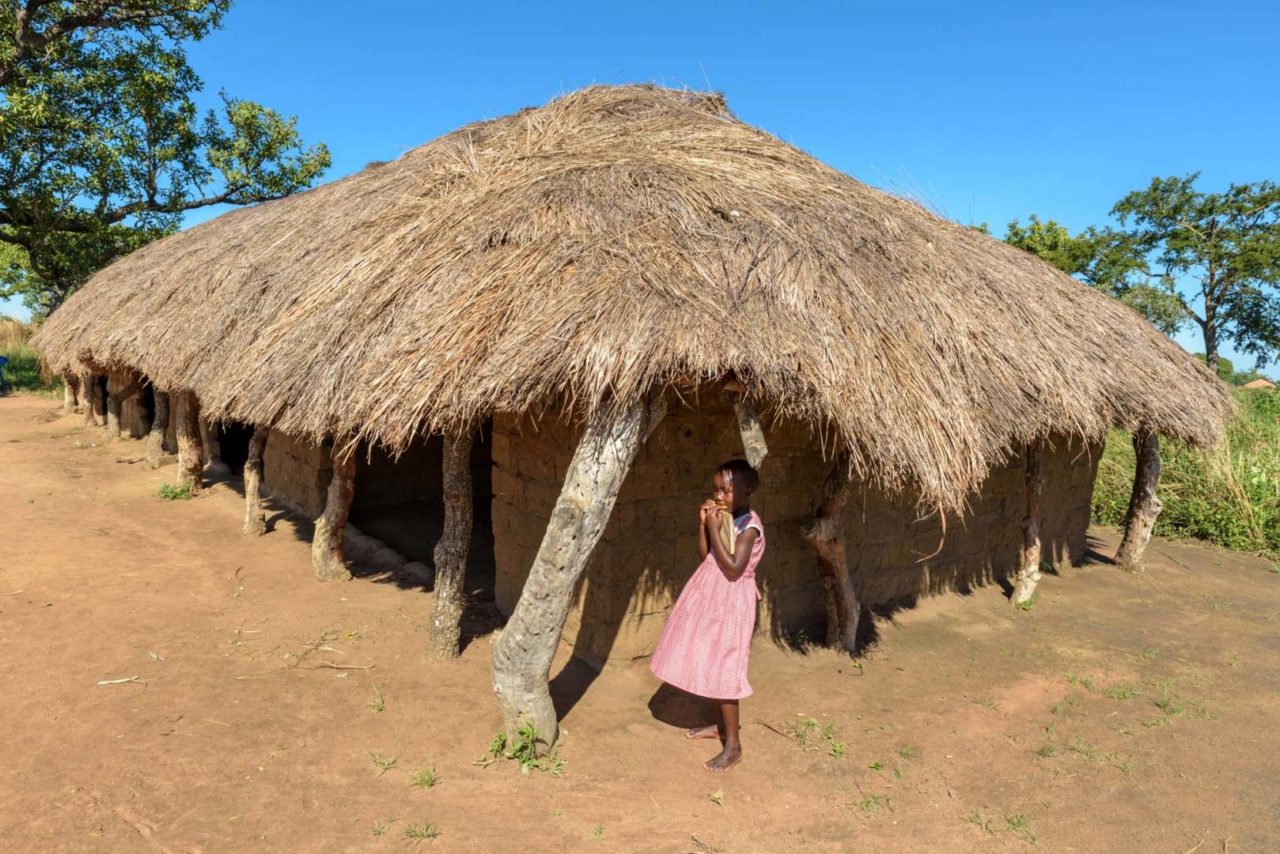
But today, her teacher, Acham Lucy, greets her with a smile and invites her to take her seat on the wooden bench.
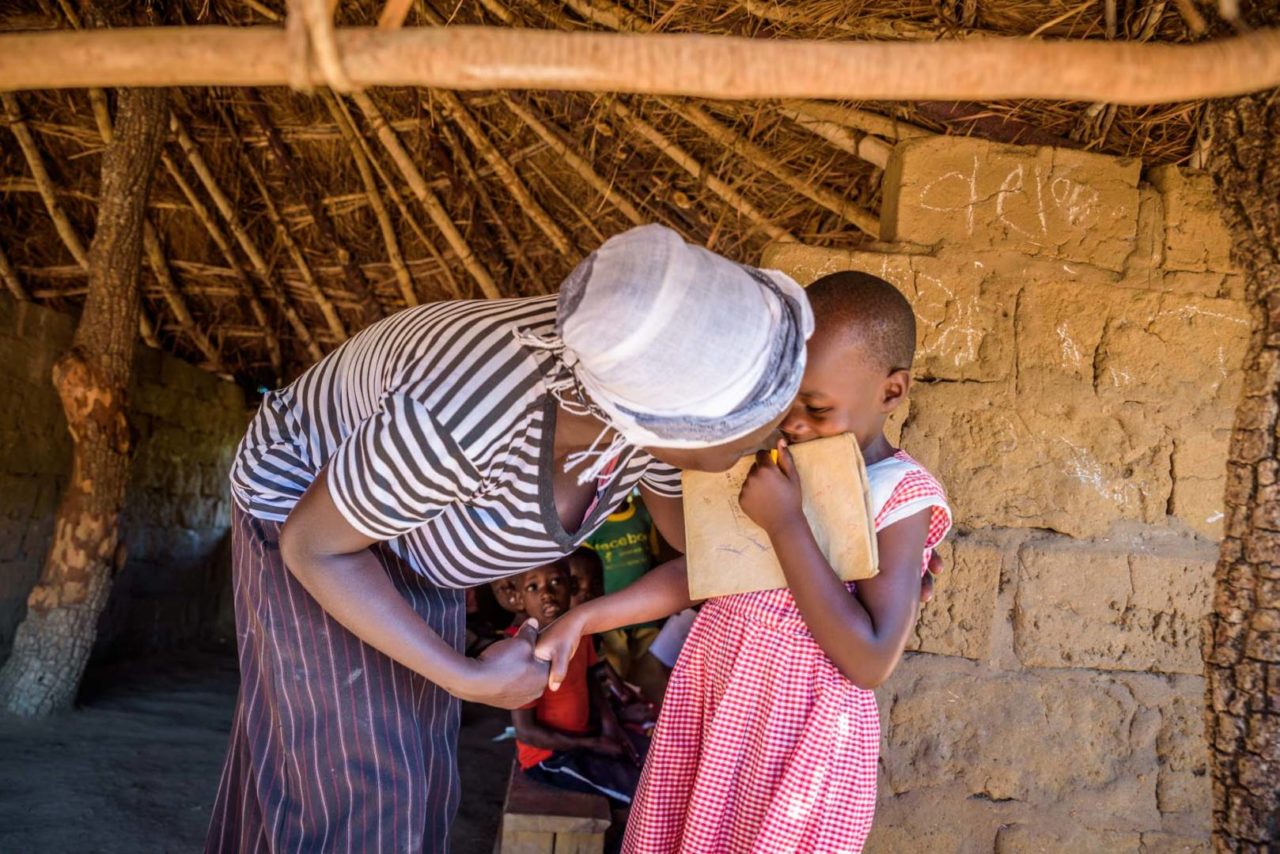
Lucy guides the students in learning their ABC’s, numbers, and types of transportation, and she ends their morning lessons with having them draw their teacher reading a book, which Grace pours herself into. She loves drawing pictures — on paper with pencil or in the dirt with chalk — as well as jumping rope, matching, and counting.
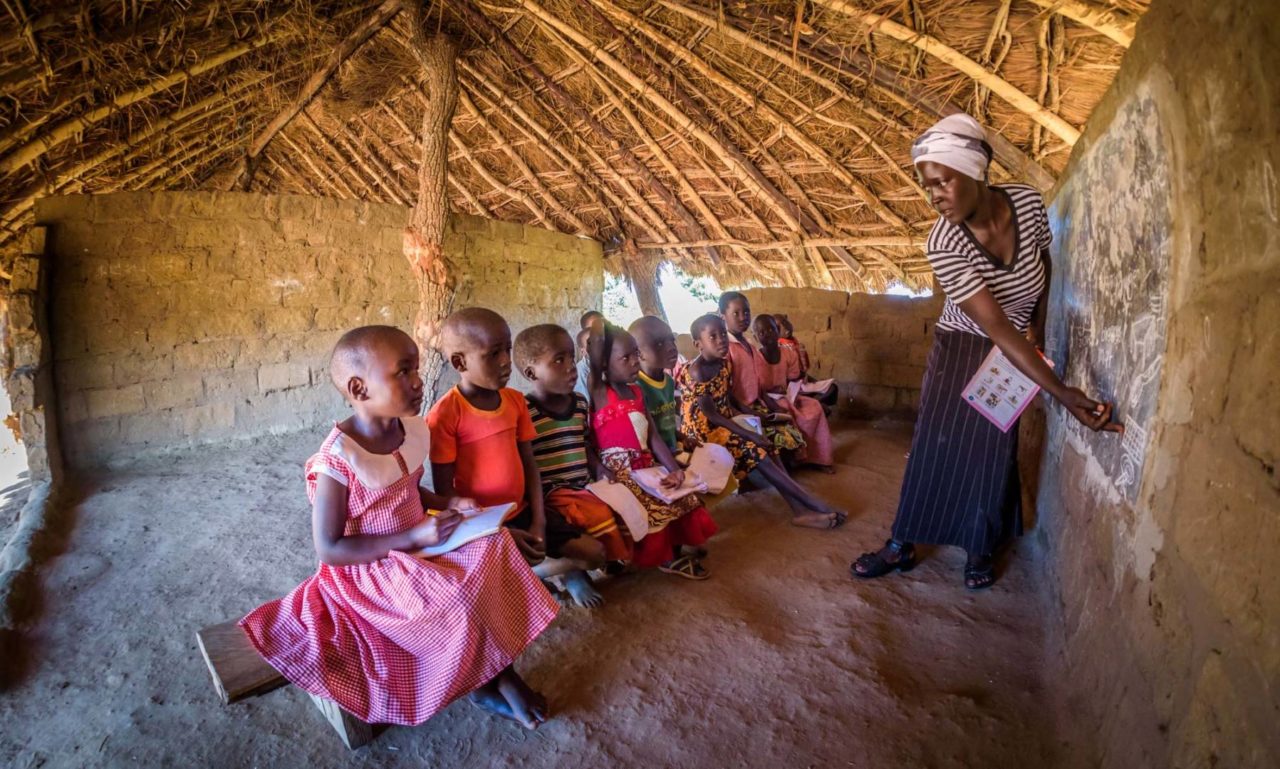
Grace enjoys school, but to make it to class, which starts at 8 a.m., she must hurry to get water in the morning. She’s often as much as an hour late — and sometimes she may simply not go at all. During the rainy season, she misses about 10 days a month. But during the dry season, when she must walk much farther for water, her grandmother Selina estimates that Grace misses 80% of her classes. And sometimes, she may miss class simply because her family can’t afford her exam fees or supplies.
Because she’s missed so many classes, Grace is two years behind in her studies. “Her performance is poor because she comes late,” Lucy says. “She has to catch up. Sometimes she can’t finish the week with coming to school. She can perform better when she attends every day and is on time too.”
Classmates often ridicule Grace for being late and behind in her studies. She says, “They laugh at me all day.”
But tardiness and absences are problems throughout Morungatuny. Many schools had to be rebuilt following the insurgency. Eloagu Julius, the school founder and a teacher, says the school started four years ago with 168 children. Today, the school has only 109 students, and of those, only 30 had arrived on time that day — a tally that isn’t unusual.
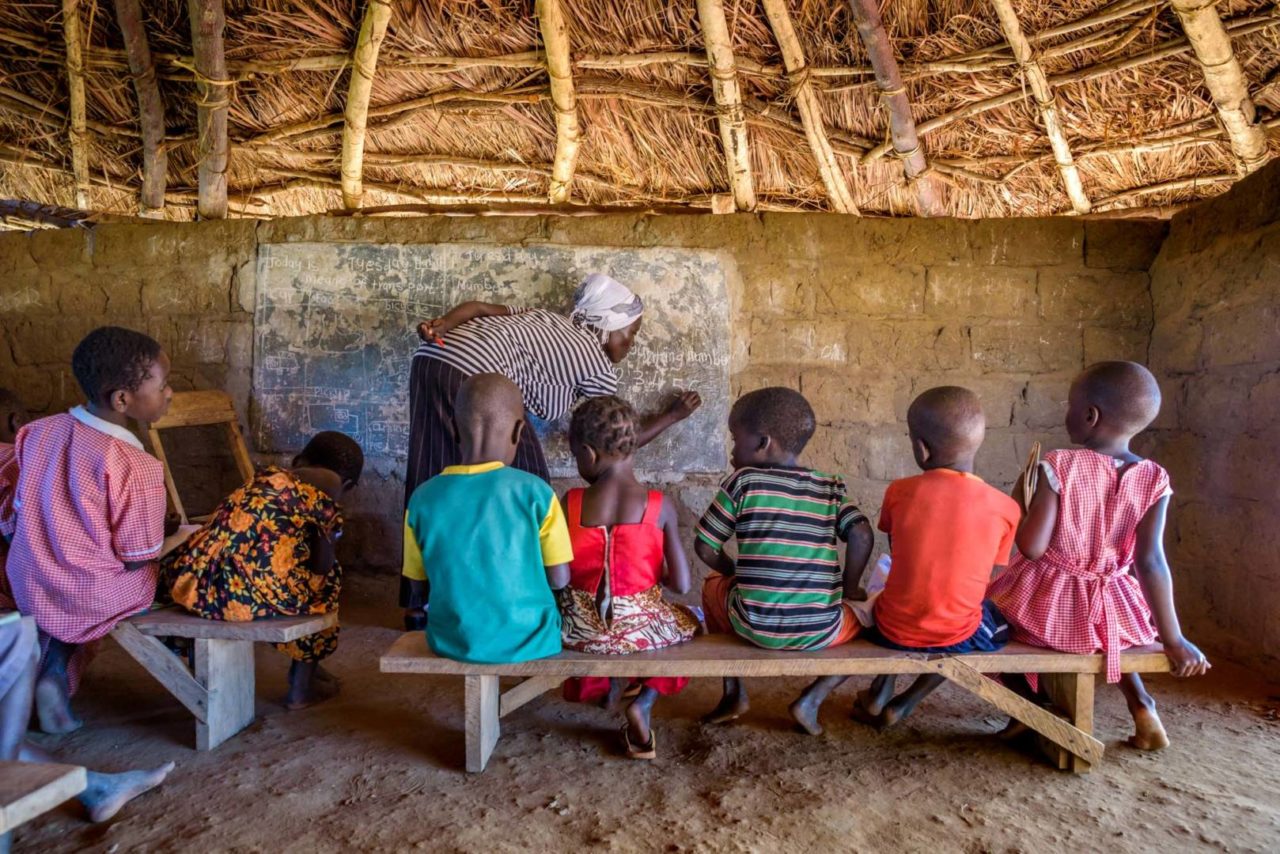
“Children [can] come to school more easily when there is a water source nearby,” Julius says. “It encourages children to run and have happiness.”
Grace longs to become a nurse. She says, “I want to inject the children and be a vaccinator so they can get healed and not have diarrhea and polio.” But she’ll need a solid education to make that happen. She also needs the proper supplies to study. Selina laments that often the children cry because they don’t have notebooks and schoolbooks to do their assignments.
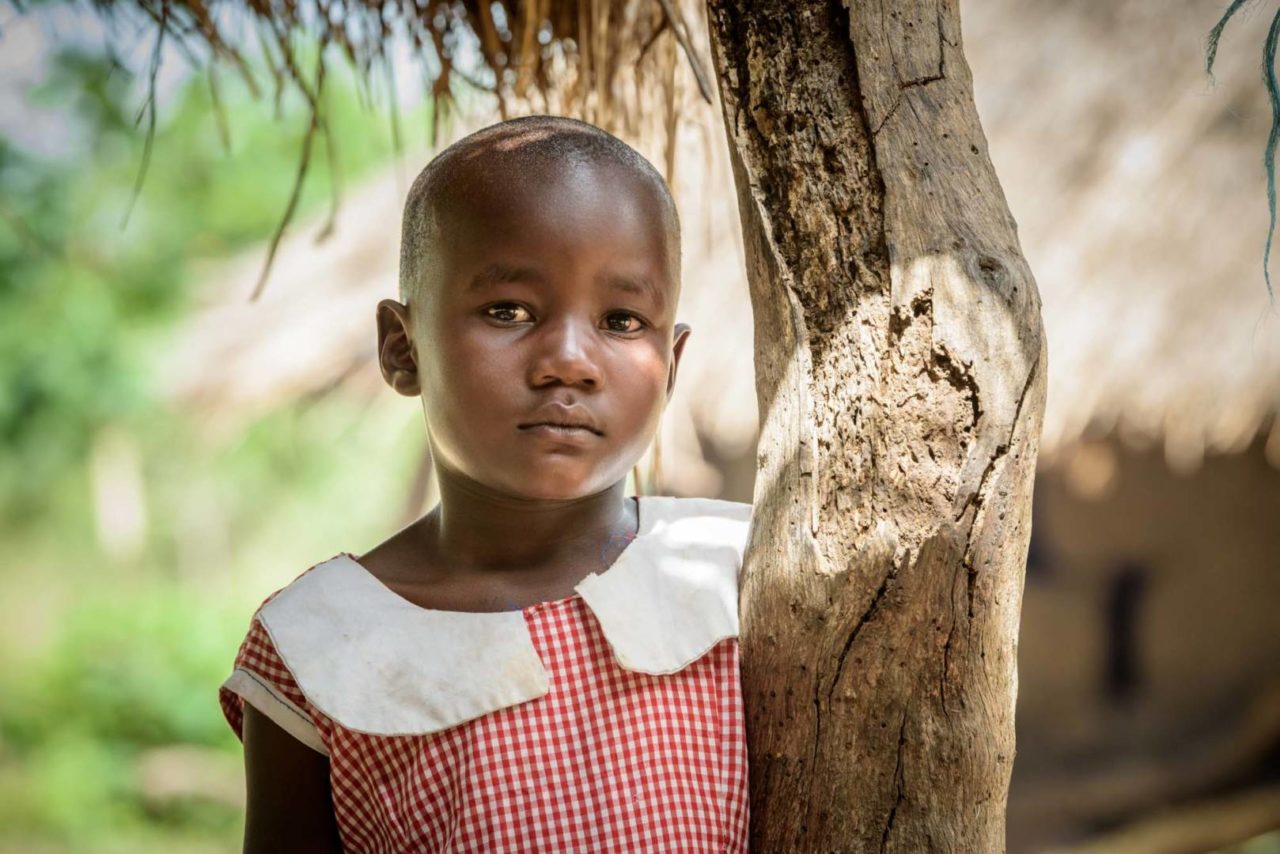
Joseph prays. “My dream, and I’m praying by the grace of God, that he gives them life, and I want my children to study,” he says. “I want one to become a doctor, one an engineer, one a police person, one a carpenter, and one to become a teacher.”
Patience thinks more families in Morungatuny would be able to have such dreams and see them become reality if the community had closer access to clean water. She says, “If water was brought nearer, a child would be at school — the child might not have to go get water.”
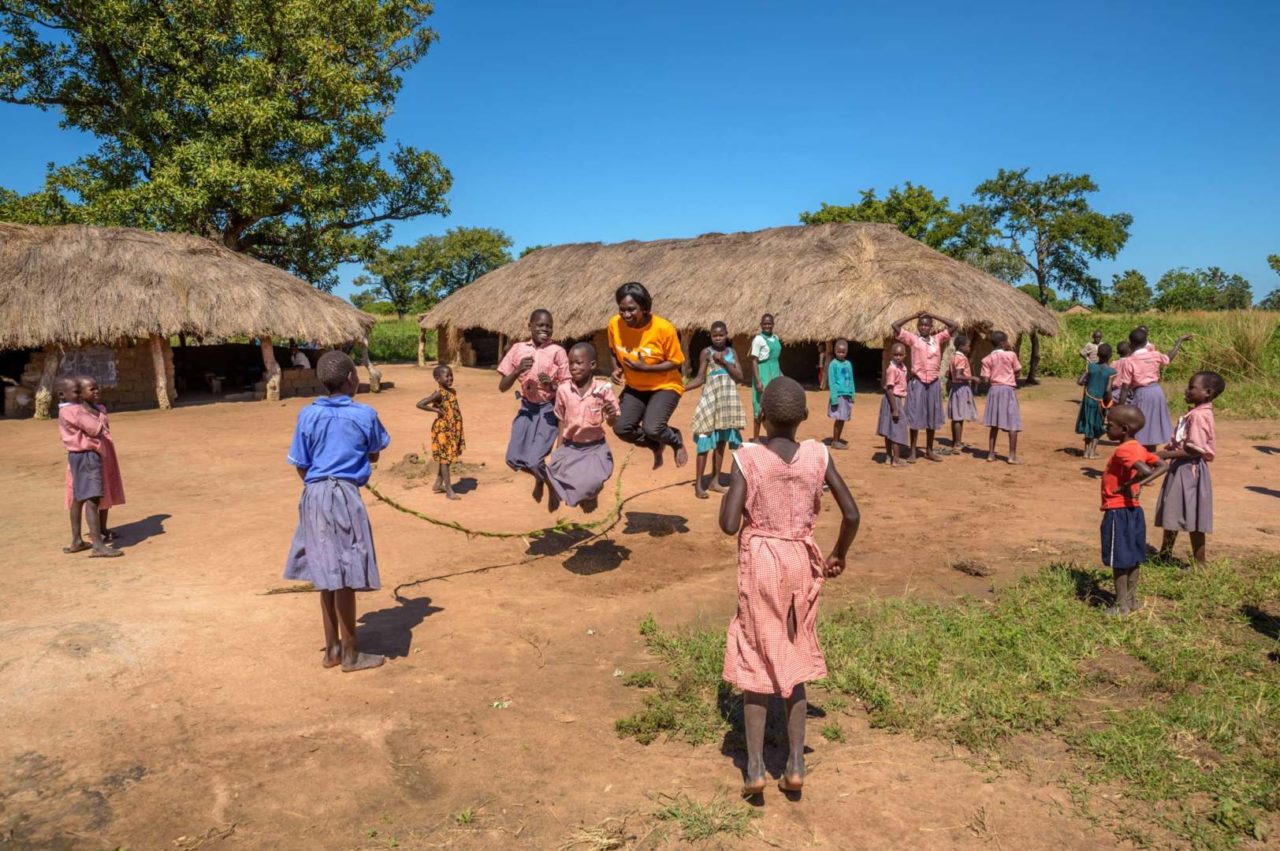
Health struggles
At home, Grace seems tired and may be developing a fever. Judith runs around, her tiny body carrying a far heavier-than-normal belly.
“Judith has a problem — she continuously falls sick,” Selina says. She’s had tests done. “They keep telling me she has a high fever and stomach pain, and they tell me it’s malaria.”
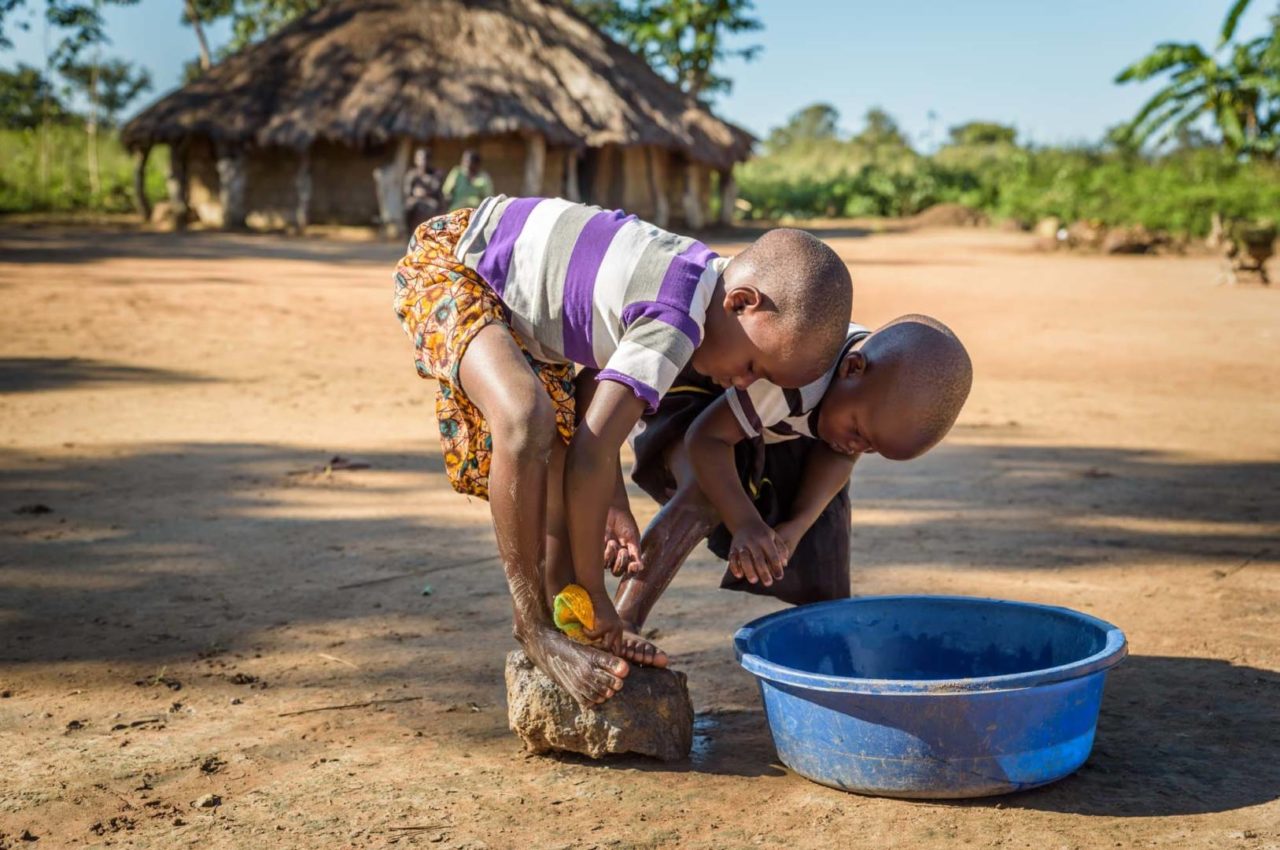
She’ll receive a health evaluation soon, but the diagnosis could also be worms, which Grace has been treated for in the past. Grace and Selina have also had typhoid, and the whole family — particularly the children — consistently gets diarrhea.
“It can be frequent,” Selina says, “especially during the wet season and when they go [for water] after the animals have drunk.”
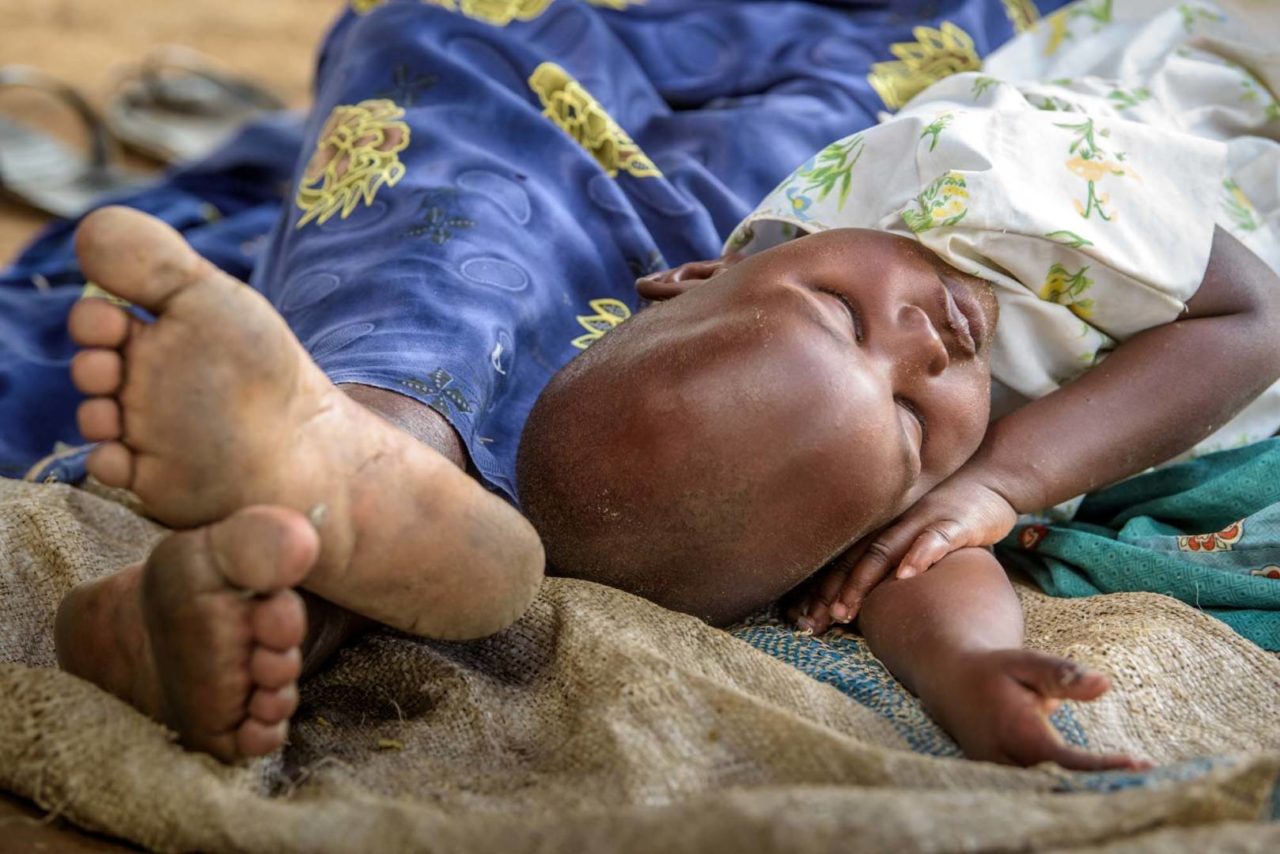
She says the children are all constantly sick. “Every time they use the water from the swamp, there are complaints of stomach problems and headaches,” Joseph adds. Grace has been diagnosed with kidney problems, but proper medical treatment is not available in their community.
The water also creates itchy and painful sores that leave scars. Grace has some on her legs that she says hurt when she walks for water. It’s only one of the pains for her young body. She says she also gets tired and her head and neck hurt from carrying the water “because it’s long, and I don’t rest on the way.”
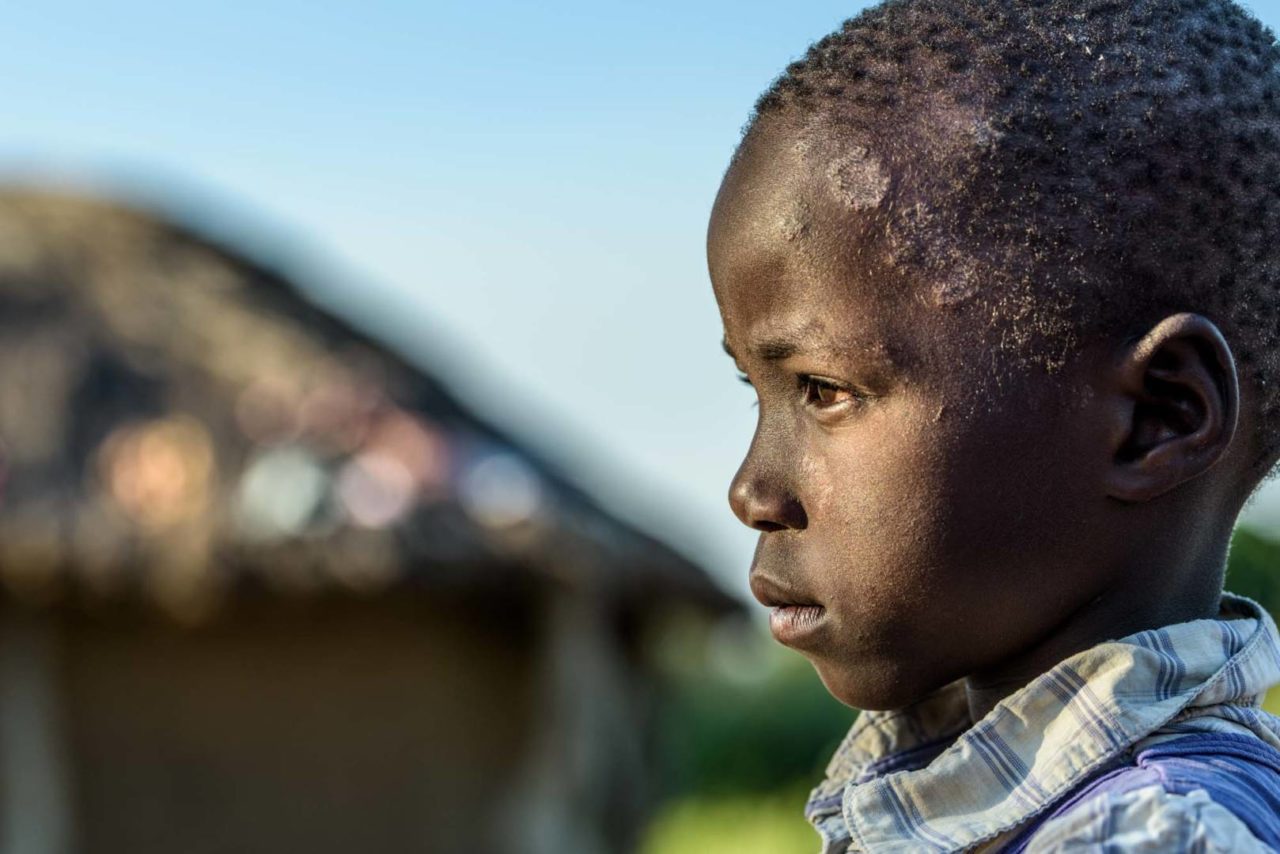
The distance to the health centers also compounds the water issues. The dirt roads to get there are bumpy, filled with holes, and in some places, only wide enough for a bike — which all make it challenging for families to transport their children.
Okello Emmanuel, 40, is part of the village health team, which serves as the first line of treatment for people in the community. He says, “There are long distances to access the health service facilities. Some parents can’t get to these, so they reach them when they’re already at an emergency level.”
Even if they do make it to the local clinic, there are other difficulties. Ojulong Aaron, the clinic officer for Morungatuny Health Center III, has a sink at the clinic that doesn’t produce anything.
“There’s no running water,” he says. “We [only] get water from the rain, so we can’t wash our hands.”
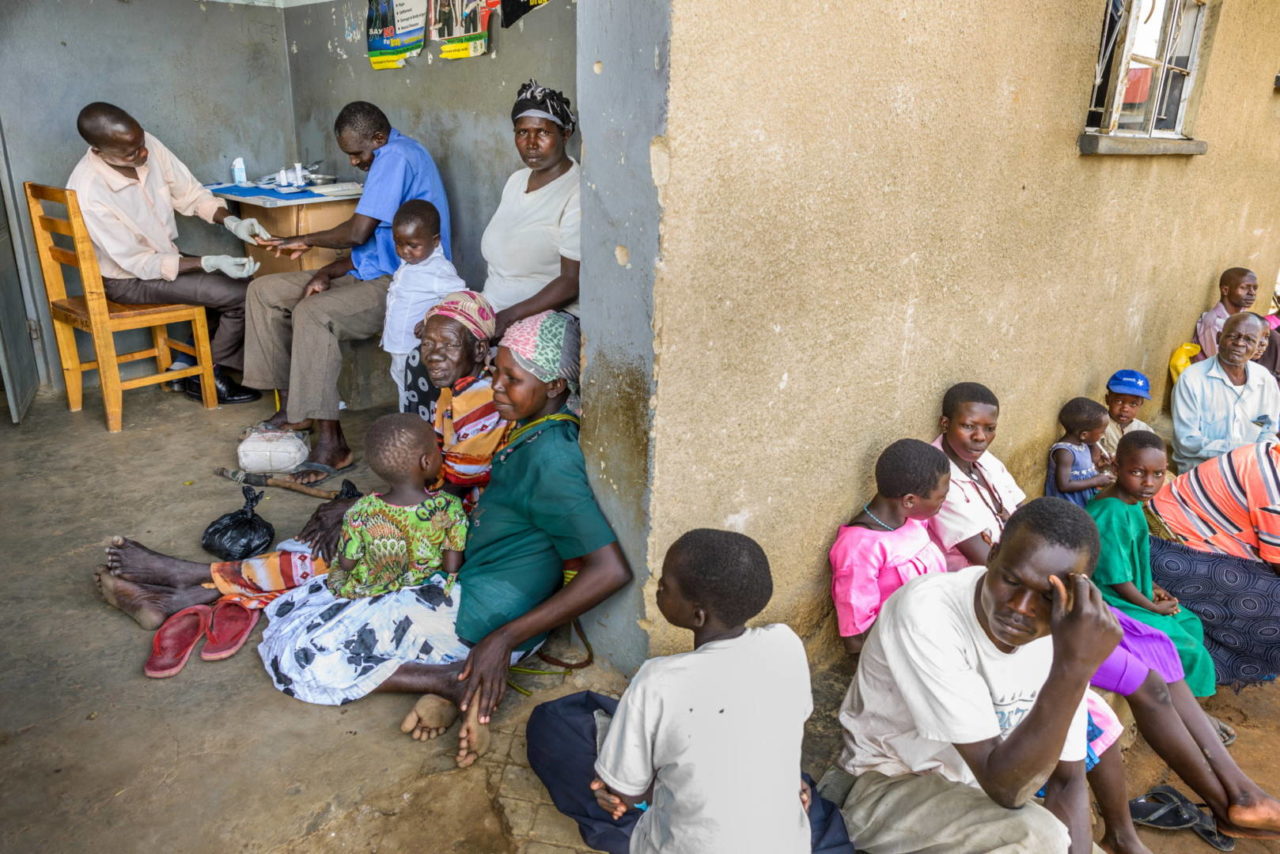
Aaron has a staff of only seven who see more than 1,200 people a month. He says malaria is the number one disease for the children. The clinic staff also handle many cases of diarrhea, typhoid, and dermatitis from the dirty water, as well as people needing psychosocial support after the LRA insurgency. He says that nationally, about 20% of people get diarrhea. The local rate is barely above that at 22%, and he hopes to decrease that number.
He says the other major challenge is a shortage of medicine and tests. “Without the test, you can’t get the treatment,” Aaron says. “Sometimes we’re blindly treating.”
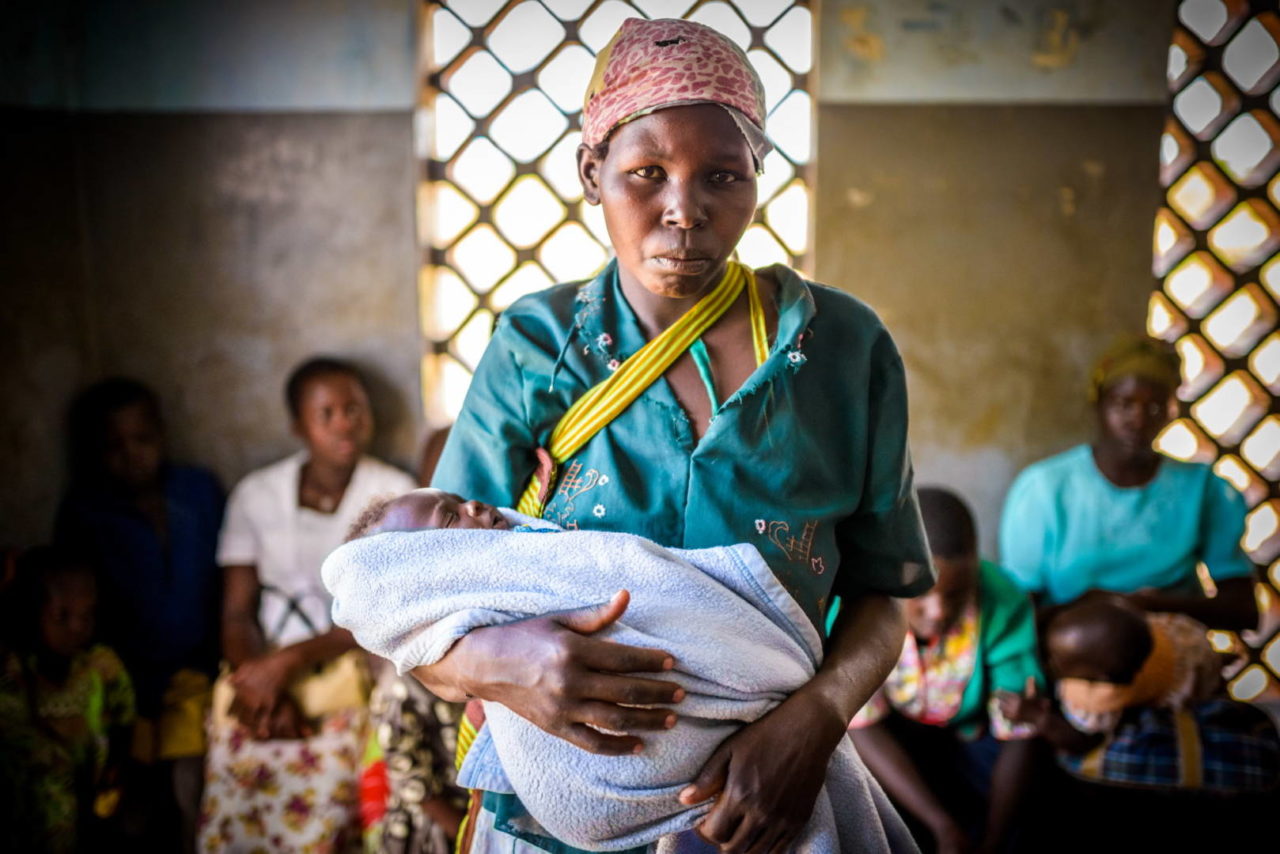
But families often can’t afford treatment elsewhere. “You have poverty rates so high, and you tell someone to buy something to clear up a rash; where would they get the money for that?” Patience says. “If they go to the health unit and find there is no medicine, the only solution is to buy from the private drugstores, which are very expensive.” So it becomes a choice between medicine and food.
That’s why Joseph continues to have problems from injuries he sustained during the terrible beating, and it’s why his children have persistent health problems. “When any of the children fall sick, I’m not able to raise enough funds to get a full treatment,” he says. “Our little Grace has a problem with the stomach and has pain in her kidneys and pelvic area.”
Aaron says additional funding would help provide tests and medicine for proper treatment. But prevention is better than treatment, so having access to safe water close to home would change everything.
Joseph sees how clean water would give his family better health, and he says World Vision can help.
“Sponsorship can help Grace get that treatment.”
Financial struggles
With so little money to support his family, Joseph struggles to pay all the costs involved with his children’s educations, which in total cost about 990,000 schillings a year (about US$278). But what pains him more is that he can’t afford the medicine his children desperately need when they’re sickened by dirty water.
He feels these strains, but the lingering effects of his injuries prevent him from farming more crops to sell at the market. “I can’t do a big plot that would bring a lot of food for my home,” he says. “My waist gets tired. I desire to do work like any other, but my energy [isn’t enough].”
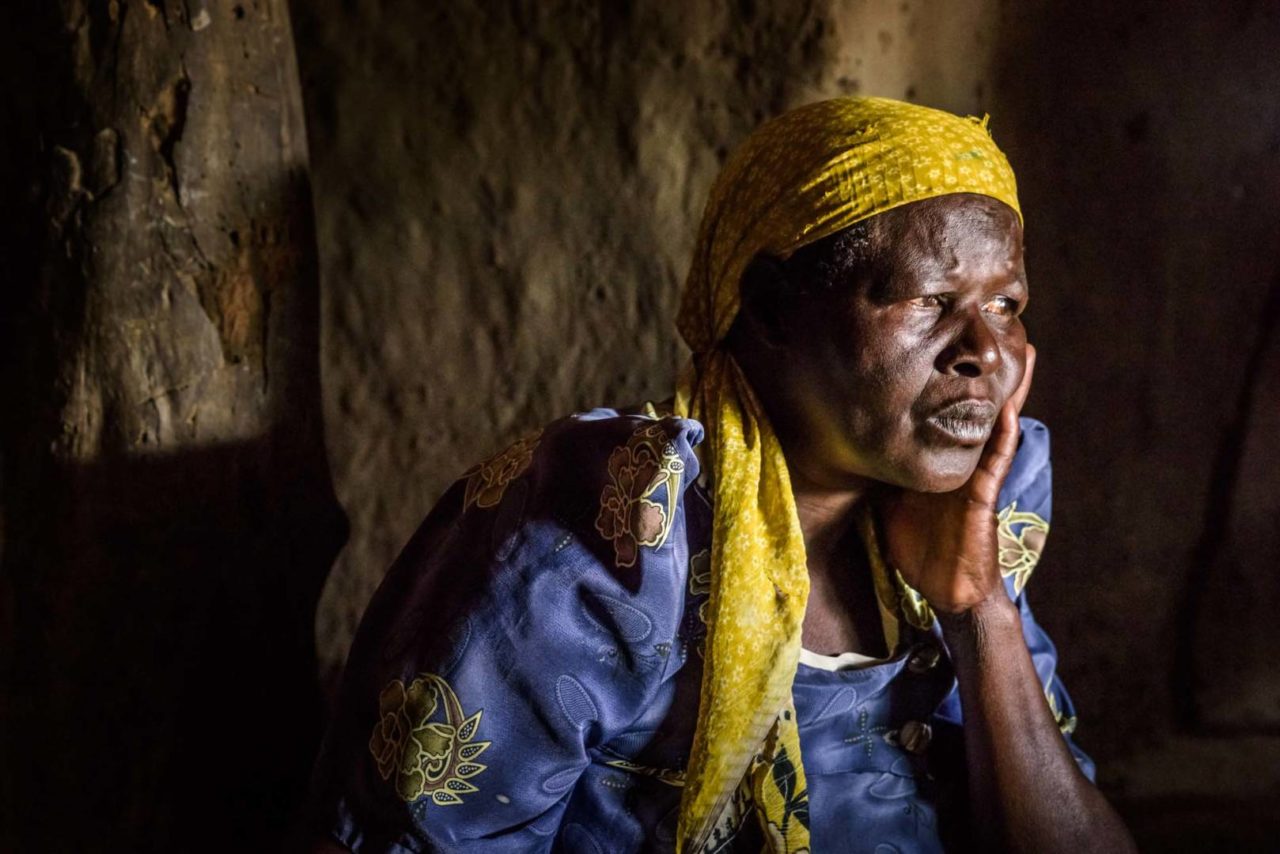
(©2017 World Vision/photo by Jon Warren)
Stomach pains, cysts, and ulcers slow Selina down when farming, so she struggles to keep up, saying, “The children are my hands of work.”
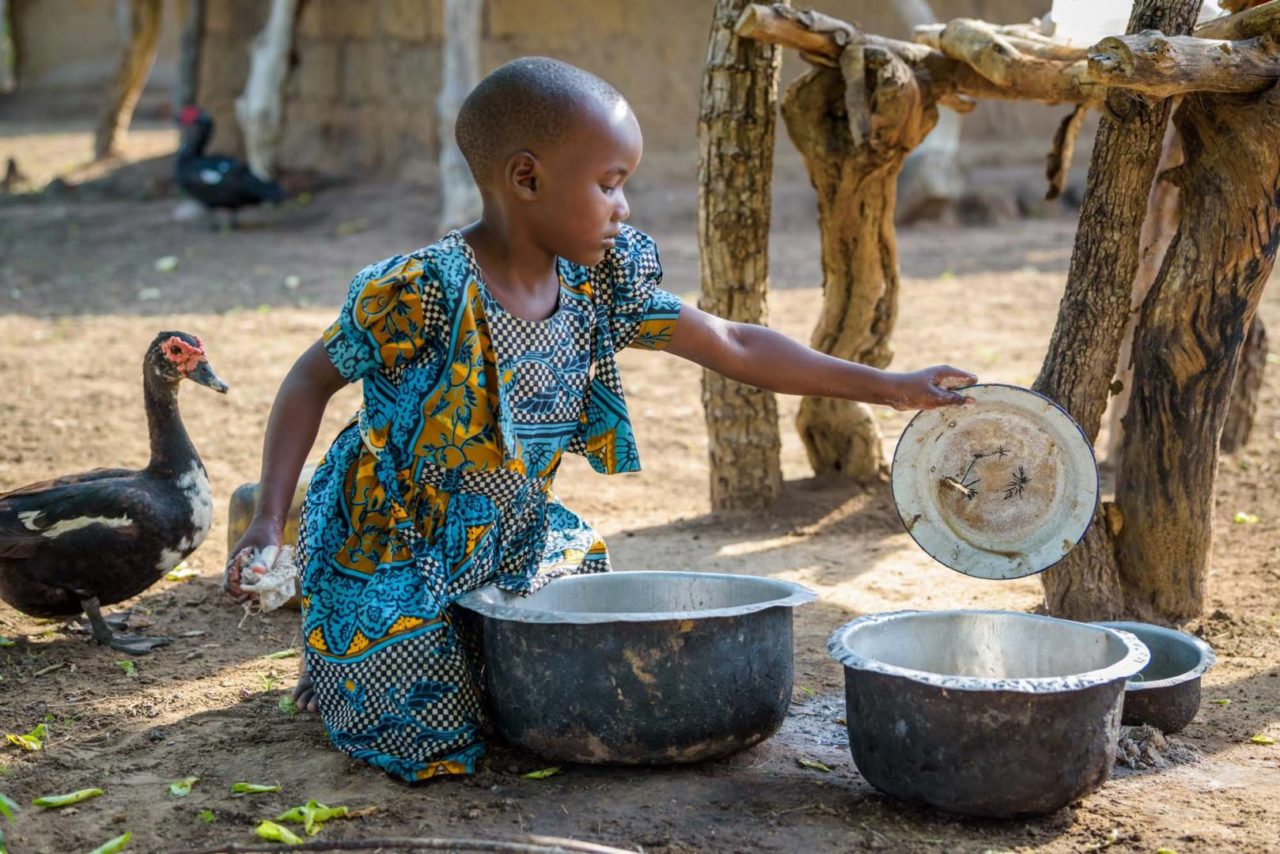
And without water close by, Joseph can’t water his crops, so they don’t flourish. Instead, he’s forced to depend on the rain — which is no longer reliable. “The rains are very unpredictable nowadays,” Patience says. “We used to have two rainy seasons and one dry season, and now we can’t predict how many seasons we’ll have in one year. … You can’t really say, ‘Let me plant this at this time.’”
By early November, Joseph’s chili pepper crops had already shriveled. He dreams of someday having resources to help him farm more productively.
“If we had a near water source, we could maybe do irrigation or draw water for our crops,” he says. “We would be able to do short-term rotating with crops like cabbages, green peppers, onions, and tomatoes. All those crops have market during the dry season because they’re not available.”
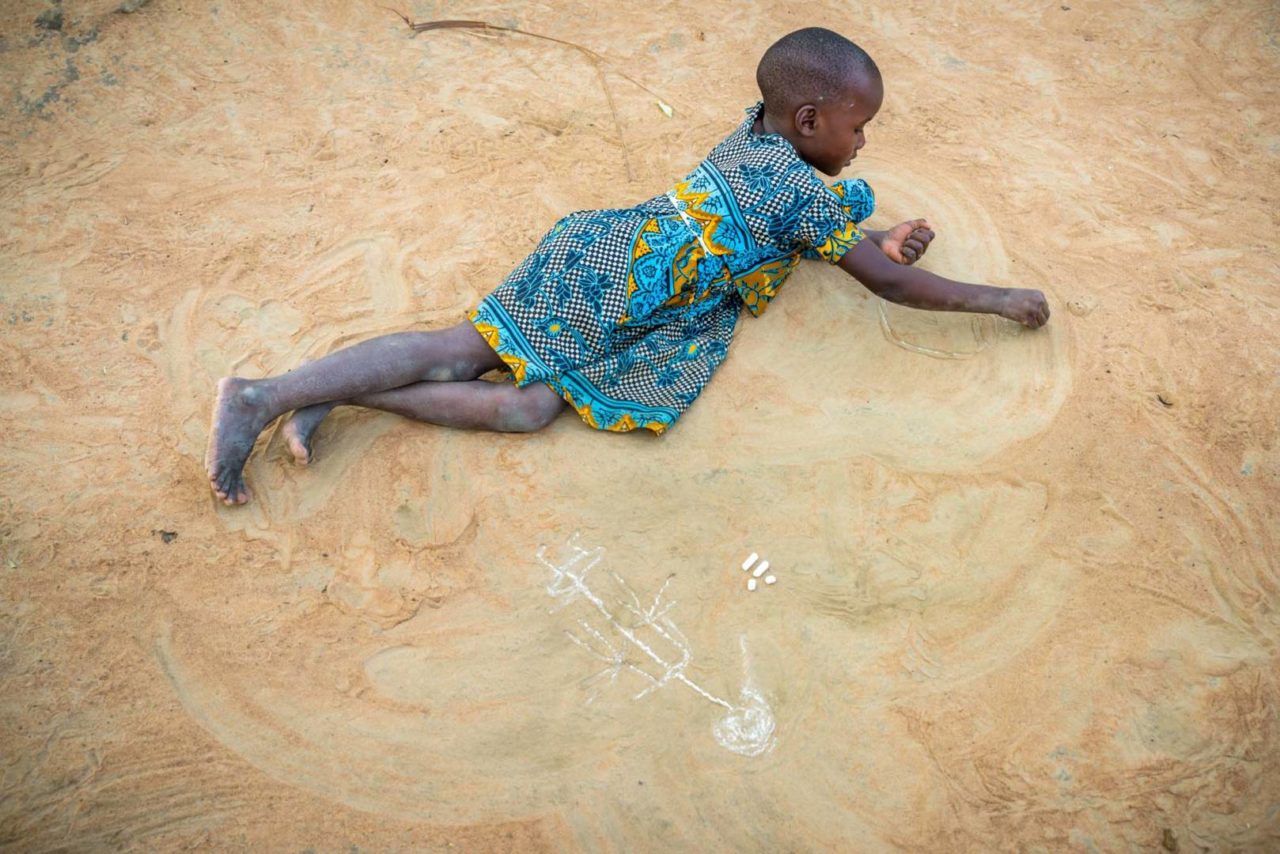
Solutions
With water the source of so many problems in Morungatuny, both the government and World Vision are working toward solutions.
“The priority is mostly water because without water, you don’t have life,” Patience says of the government’s efforts. “But the resources we have are very meager.”
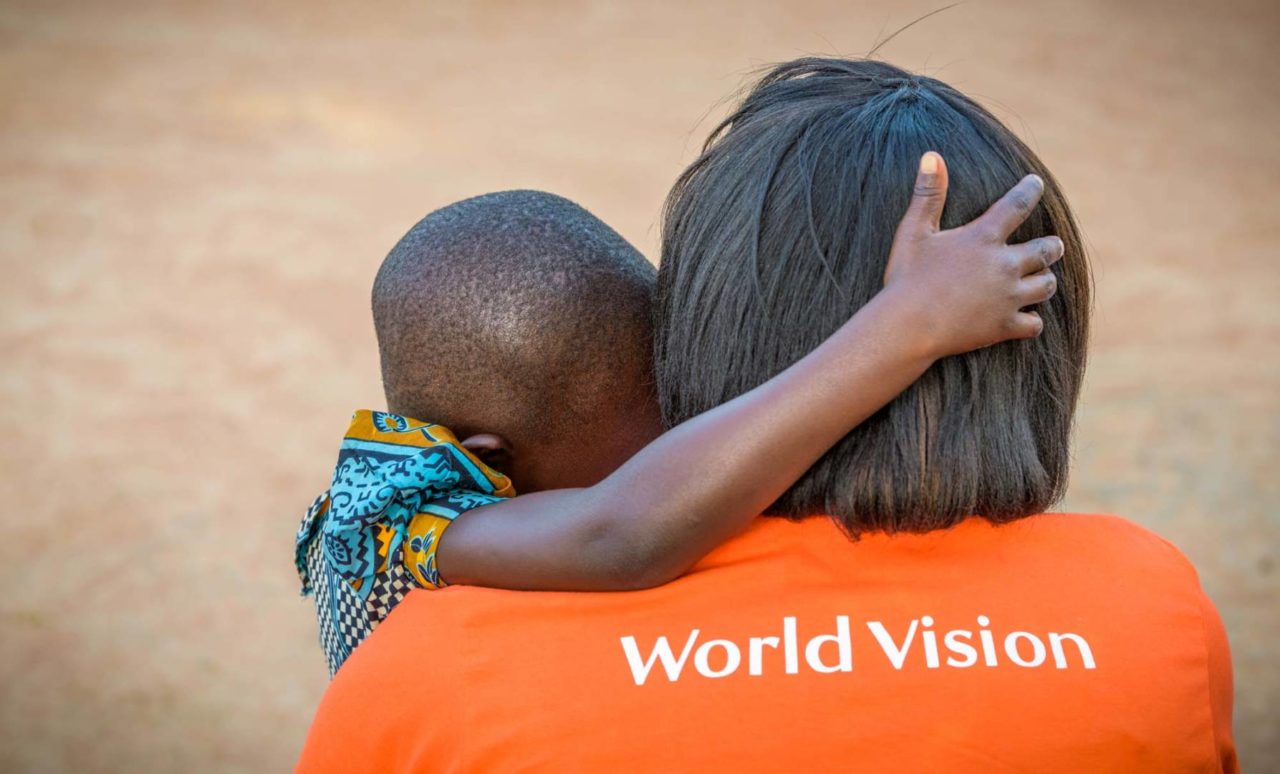
She says the government is able to rehabilitate one borehole a year. It would take 17 years to fix what already exists, let alone build new wells or fix more. Over the last four years, World Vision has installed four borehole wells in the district and trained community leaders on how to maintain the wells.
“World Vision plays a big role because it does almost everything a government is supposed to do,” Patience says. “It’s helped us with livelihood, agriculture, sponsorship, education. The pit latrines they’ve given us are improving the sanitation in the schools. It has also drilled boreholes. It encourages us and trains us on other issues that are related. The community is empowered.”
She says the evidence of that empowerment is visible throughout other communities in the district where World Vision hasn’t yet worked, but where the principles it teaches are already being applied. Patience says it “shows that people have really learned something” when you see practices and programs being shared by word of mouth.
Mary Margaret sees change in the community as well as a correlation between clean water and recovery. “We’re grateful to World Vision for the healing we have seen,” she says. “We have some boreholes.
It’s not enough, but we have some — we are lucky. The relationship is so good. They are helping.”
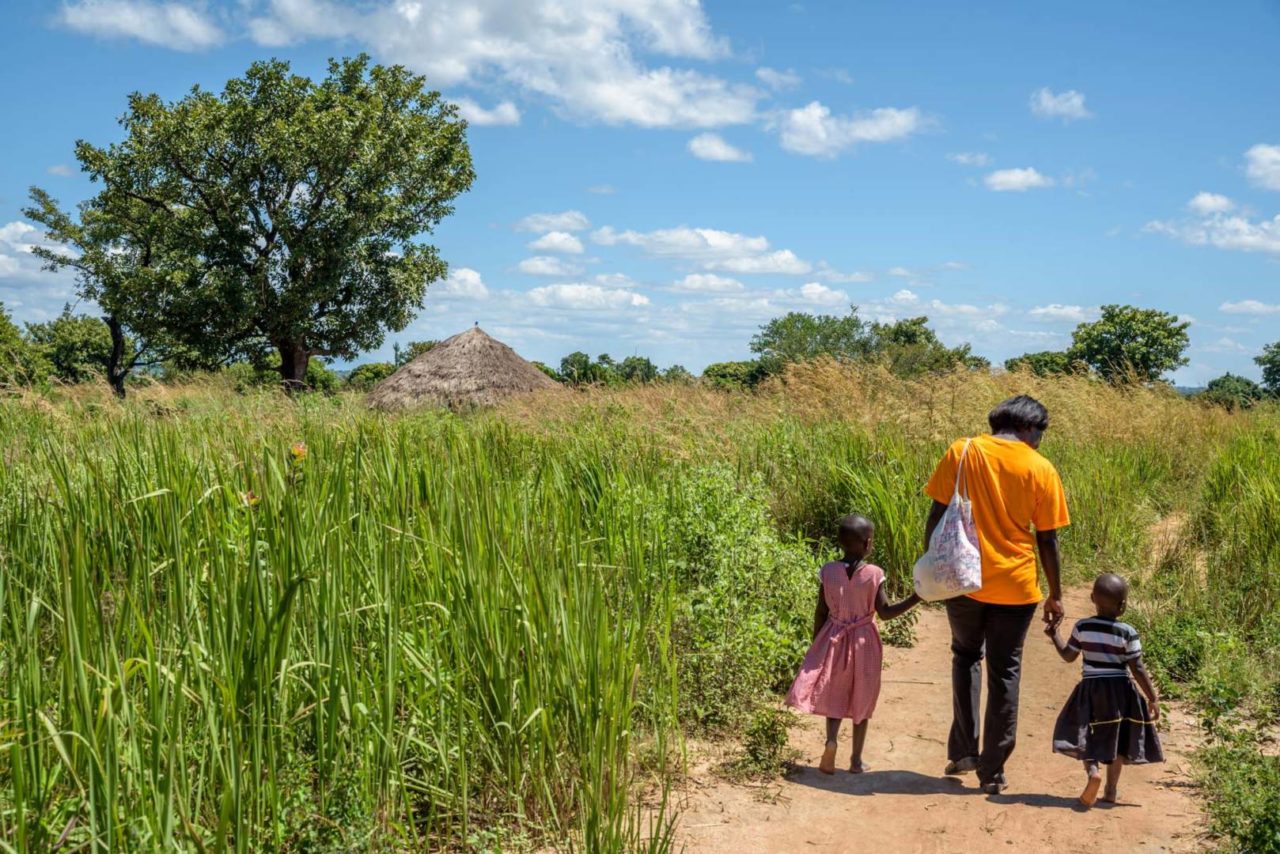
World Vision is working with the community to install three boreholes in the area in the year ahead. Paul Oiesigye, a water engineer for World Vision in Uganda’s eastern region, says drilling for shallow wells in the area has been challenging.
“You have to drill and go deep to get water,” he says. “In some areas, you’re really limited by the underground water situation.”
Elizabeth noted that some of the borehole wells run dry faster than expected. World Vision wants to install a mechanized system. Paul says, “A solar-powered, motorized water system is cost-effective. They use a generator or a grid. The only challenge is in the initial investment of buying the solar panels. After the initial investment, the people are able to manage that system.”
A project like this can help about 20,000 people, in comparison to 900 served by a regular borehole.
The first priority is the health centers, says Paul: “We need to ensure the health centers are equipped with continuous water year-round. We can’t mainly rely on rainwater.”
Elizabeth says that if World Vision can drill 13 boreholes, they can reduce the local walk for water to around 3 kilometers. With 20 boreholes, the distance will drop to 1.5 kilometers — significant progress toward reaching the ideal 1-kilometer threshold. She says, “We will be very intentional,” when World Vision plans the well locations with the community.
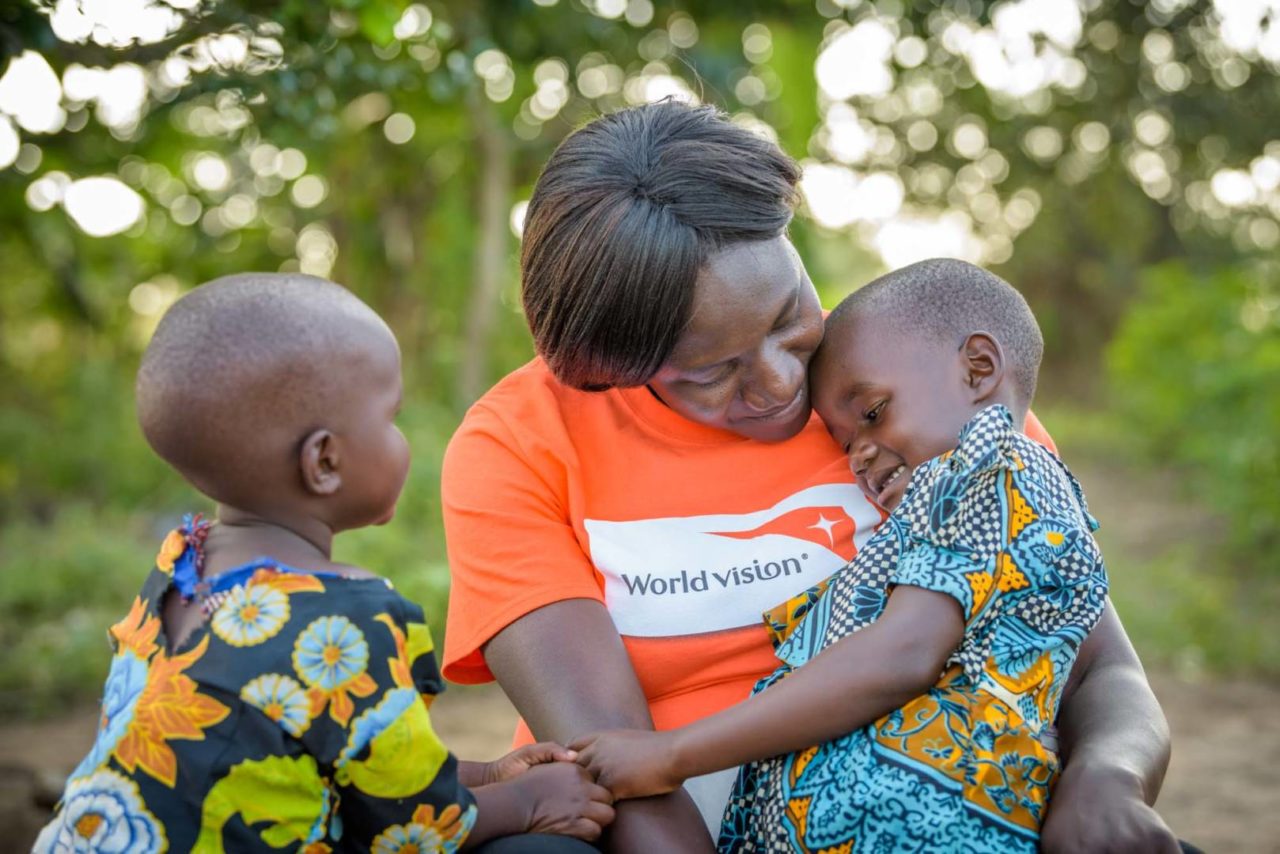
Even though Joseph still struggles with pain and Grace and Judith are still walking a long path for water, the family is hopeful. As they attend church every week, Joseph encourages his children to seek God in the midst of their burdens.
God will remove this wound of pain. —Joseph
“I use the Bible and tell them the living testimonies of our home based on the trials the family is going through,” he says. “Every challenge we go through, I share with them and encourage them every Sunday to go for prayers, and when they go, they shouldn’t just be going to church; they should pray, repent of anything the family has done to God, pray for God to forgive them, and pray for God to open a way for them. God will remove this wound of pain.”
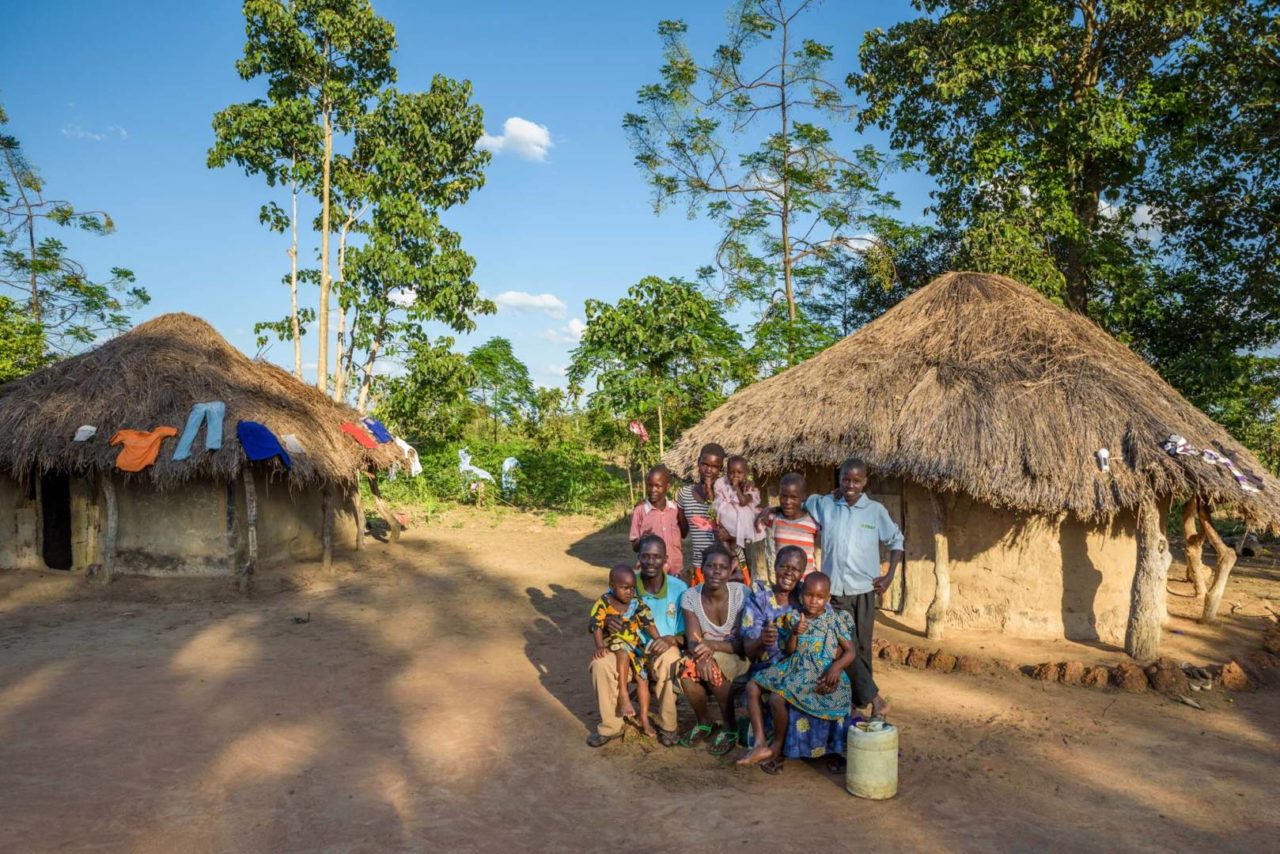
How to help
- Help bring water to communities like Grace’s. A gift of $50 provides clean water to one person, bringing lasting change.
- On May 16, 2020, join others around the world to walk or run — and change a life! — through World Vision’s Global 6K for Water. Learn more and register.
- Pray for families who don’t have water and for families as they prepare to receive clean water in their communities.
Editor’s note, April 2019 — Changes for Grace and her community
Last year, we introduced you to 5-year-old Grace of Morungatuny, Uganda. She walks long distances to get dirty water for her family, who was struggling to overcome the poverty they faced after the Lord’s Resistance Army terrorized their community more than a decade ago.
But last year, Grace gained a sponsor — Nicole — through the Global 6K for Water. Child sponsorship helps fund clean water projects and other development initiatives, as clean water is critical for a community lifting itself out of poverty.
Lasting change takes time, so while Grace’s community is awaiting clean water, it has already undergone other changes as a result of child sponsorship.
The community now has a new health clinic closer to them to help meet their immediate medical needs. Because of it, Grace and her sister, Judith, have experienced improved health. Grace’s school received desks, which will help the children learn better than the wood benches they previously sat on. Her father, Joseph, also finished building a latrine for his household, so the family now has better sanitation at home. Through direct support from her sponsor, Grace’s family now has better bedding, which will aid in better rest after their long days.
Join us in thanking God for how he has worked in Grace’s life as a result of child sponsorship, and let’s pray for her community as they work toward getting clean water.
